#and like wasn't the whole point of a lot of that framing in the manga was how incredibly not idealistic it was ?
Text
chainsaw man endings are all soooooo so good except for ending 7 which sucks
#startign off new years by being unnecessarily verbose and annoying in the tags of tumblr posts hi guys#anyway it's not just on a music level. and god damn i hate the music but mostly conceptually i do not like it.#it's very creative visually like all the other eds but like. dating sim game with denji and all the girls that have been introduced...#i mean i might be overstepping if i straight up assume that romantic aspects/framing werent there at all#but this feels so off to like. actively play into the vibe. this isnt just a problem w the ed i hate how they extended#the himeno and denji scene in the anime. bc god damn thats a minor bro!#and like wasn't the whole point of a lot of that framing in the manga was how incredibly not idealistic it was ?#with makima and himeno it's examples of how these fully adult women manipulate denji bc he's been starved of love his entire life#and with power it's to show how despite how utterly close her and denji are they have no romantic feelings for each other at all#rohan if youre seeing this ur so so right abt aroace denji i believe in it more every passing day#post was made bc i was listening to a playlist of the csm eds and it got to ed7 and i went 'fuck i wish this one wasnt here i hate it' lmao#csm
4 notes
·
View notes
Text
I finally got to sit down and finish episode one, and i've got some thoughts!!
I think that introducing garp as a big player right from the get go is a really great idea. His presence at the execution made sense, and his dynamic with roger did well to help establish both of their characterisations
Roger's actor did a phenomenal job with the eerie laugh and his complete irreverance in the face of his own death. I love how he delivered the wealth fame power speech!
It was a bit surprising to me that they showed roger actually getting killed, but honestly i'm in total approval of this direction they're taking with the live action. I really like the more brutal approach, especially because oda's refusal to kill anyone outside of flashbacks pre-marineford is one of the biggest complaints i tend to hear from people. Seeing zoro dragging around the top half mr 7's corpse was so jarring, but it was a good choice
Ilia's perfrmance as alvida was absolutely amazing. I like that they changed her catchphrase from the most beautiful woman on the seas to the most powerful
Overall, i really like the different transitions between plot points, and how this episode set things up in future arcs. All the different things that go on in shells town feel so much more better interconnected than they did in the manga. I'll go into this more in another post, but like one example of what i'm talking about is how the reason zoro allowed himself to be tied to the post was because morgan threatened that if he didn't agree to it, he wouldn't be able to collect any more bounties from any marine bases. It also gives zoro mire of a reason to join luffy - he knows that at this point there's no eay he can continue being a bounty hunter now that morgan has it out for him. So how else is he going to meet other strong swordsmen? By joining a pirate crew of course.
The shanks flashback was awesome! His dynamic with luffy was really endearing, and again i do like that they didn't have higuma attack shanks. That's one thing that never really made sense to me in the manga - i get thst yoy don't have to solve everything with violence, but there's no reason for shanks not to have fought back against someone who was attacking him, even if he did know they couldn't possibly hurt him
Also on shanks' flashback - the scene where he found out luffy had eaten the devil fruit was AMAZING. What a fantastic idea to have little luffy framed in sunlight! And the utter heartbreak on shanks' face as he realizes that there's no way luffy will ever be able to have a normal life now...
Of course, we gotta mention the snippet of Binks' Sake we heard in the scene where shanks is stitching up luffy's cut. I recognized it instantly and it made me really emotional. Love all these little easter eggs they have for long time fans of the series. In addition to this there was alsp the cavendish, foxy, and bellamy wanted posters which we knew about from the trailer
Speaking of wanted posters - what a COOL way to introduce the other pirates!
Morgan going on his monologue about capturing kuro is SO funny know what's gonna happen on a few episodes. Oda played it a lot more subtle in the manga but i like that they came right out and said it here.
And while we're talking about foreshadowing, it was a fantastic idea to include the mr 7 fight in this season! I really hope we get a season 2, just sp we can get the payoff for this great setup.
I'm a little sad that we didn't get to see the luffy and koby hug that was shown in the behind the scenes video (i think that was the one?). I really hope that wasn't cut because i loved that little scene. Maybe it'll happen later in the season?
Buggy's introduction at the end of the episode was SO good. I loved his whole vibe, with him lounging so confidently in his chair, his creepy laugh, everything. I'm excited to see the next episode! They better not have cut chouchou out 😭
#one piece#one piece spoilers#opla#opla liveblog#opla spoilers#spoilers#monkey d luffy#roronoa zoro#nami#buggy the clown#monkey d garp#gol d roger#axe hand morgan#mr 7#koby op#helmeppo#iron mace alvida#red hair shanks
345 notes
·
View notes
Text

My memory is terrible so I wanted to do a breakdown of my stuff every once in a while. Might be monthly, might be whenever I feel like it.
QL - Currently Watching
🇹🇭1000 Years Old [10/12] - This is dragging and I am incredibly bored.
🇹🇭23.5 [4/12] - This show is incredibly cute and I'm smiling through the whole thing. Aylin is my favourite and I'm hoping against hope for the teachers to become a couple. Make it happen gmmtv!
🇹🇭Deep Night [6/8] - The long shots are killing me but the story is moving fast. There's a surprising amount of good communication and the throuple is almost inevitable a this point.
🇰🇷Jazz for Two [6/8] - This is the first bl show where I read the source material before the show and I wish I hadn't. The changes that were made just don't make sense to me, because I don't see how it serves the story. But putting that aside, the story feels rushed and the pacing is weird. The second couple doesn't read believable with this time frame. Anyway I might edit this post when I watch the last 2 episodes. [EDIT] Completed. Final thoughts here.
🇯🇵Love is Better The Second Time Around [4/6] - Why must you do this again Japan? 6 episodes for this one? I'm not happy about this. This show is so good. I love how the mains communicate, not to mention they are beautiful to watch.
🇯🇵My Strawberry Film[7/8] - I have no idea what this show is about nor it seems does it. Do I care at this point? Nope, not really. Let it be over.
🇹🇭To Be Continued [6/8] - This is getting into The Promise territory and I'm not amused. Another one that is dragging and I like the second couple but they barely have any screen time. I'll finish it because there are only two episodes left but I'll be sprinting to the finish line.
🇹🇼Unknown [7/12] - It hurts so good. The songs were killing me this episode. I really liked the separation, I think it was necessary for them. Yuan seems more mature and it will be interesting to see how it changes the relationship.
QL - Finished
🇹🇭Cherry Magic Th – What a wonderful surprise this was. Tay and New are beautiful together and their chemistry was on point. I really liked how the source material was used here.
🇯🇵Cherry Magic Anime – It was quite faithful to the manga with only a couple of deviations and of course it didn't cover everything but I really enjoyed watching yet another version of these characters.
🇹🇭Dead Friend Forever – It was quite a ride. I specially enjoyed the communal watching of this one and all the theories as more people tuned in. Didn't love the ending but it was better than I thought. Still not over White though.
🇯🇵Although I Love You, and You? - Started great, the middle was meh, and by the end I wasn't invested enough in the couple so even though it ended happy, it didn't make up for the rest of it.
🇯🇵Perfect Propose - Great all the way through. I loved this characters a lot and still think it's amazing how well the time was used here.
🇯🇵Ossan's Love Returns - It's Japan at it's finest. Love, food, chaos, found family and cherry blossoms. What more can I ask for?
🇯🇵She Loves to Cook, and She Loves to Eat - My heart grew.🖤
🇹🇼Anti Reset - This is one of the most frustrating shows I've watched in a while. This started off strange and most of the show doesn't seem to know what it wanted to say about the AI part of it. It drove crazy on a weekly basis. But I thought their chemistry was really good and they are just an adorable couple.
These 4 VBL series [Stay By My Side, You Are Mine, Vip Only] were a mixed bag for me. I think Stay By My Side is my favourite overall.
🇨🇳The Spirealm - First of all, Ruan Lan Zhu is absolutely gorgeous and his outfits are always perfection. The visuals are really good. This was definitely not a cheap production. The sets for all the doors are incredible. Talking only about the game, I gotta say the second door was my favourite. The bromance toes the line, but I'm not surprised this was taken down. I think if they'd kiss it would be less obvious than some of their scenes.
I'm not going to spoil the ending but if you're thinking about watching here's your warning. A bit after the halfway point it gets incredibly sad and the ending is just heart-breaking.
Dropped
🇹🇭A Secretly Love [3/10] 🇹🇭Kiseki Chapter 2 [2/6]
Also haven't started Two Worlds because I'm waiting to know if I should bother. I'm experiencing a bit of Thai bl fatigue so we'll see.
Rose Watches OJBL
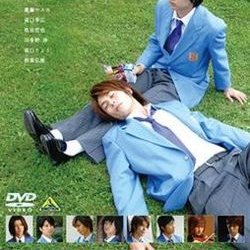
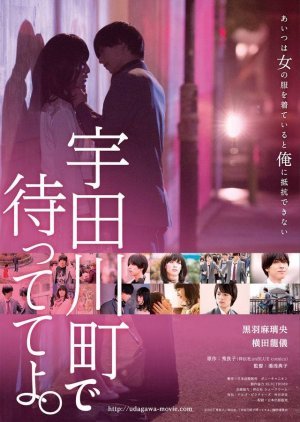
Takumi-kun 1: And The Spring Breeze Whispers (2007) - The editing is choppy as hell and it gets hard to understand the characters motivations. And the acting is not good. Yeah, not a fan of this one.
Udagawachou de Matteteyo (2015) - This one is weird. I recently watched Life as a Girl so I admit that the comparison doesn't help this one at all. The idea is interesting but the execution is poor. There's a couple of scenes that are a bit hard to watch. In this particular story I think if we had a bit more insight to the characters motivations it would've helped me connect and feel more invested.
In the end, for my particular goal it was fine I guess.
Other - Watched

🩷Tengu's Kitchen (2023) | Fudanshi Bartender no Tashinami (2022)
Formula 17 (2004) | Mars: Zero no Kakumei (2024) | 🩷Joshi-teki Seikatsu (2018)
1 Year of Rose-Tinted Glasses
It's been a year of Rose this month. And it's been kinda great. It took me a while to get over my shyness here and I still feel intimidated but it's gotten better. The people in this space have been really kind to me and I appreciate it so much. Thank you so much for the space.
That's it for right now. As usual my ask box is open for gif requests and any other questions. Happy Easter to all who celebrate.
Have a good week💜
#rosy watchlist#playboyy the series#although i love you and you#cherry magic th#cherry magic anime#ossan's love#anti-reset#my strawberry film#perfect propose#1000 years old#to be continued#Unknown the series#multi bl#rose rambles#takumi kun series#Udagawachou de Matteteyo#tengu no daidokoro#mars zero no kakumei#jazz for two#Rose Watches OJBL
55 notes
·
View notes
Text
Phee is lying
I mentioned a theory of mine a few times (or is it hopeful thinking ?) and I decided I could share the big outline. I don't feel very legitimate making this post given that I'm one episode and a half behind, but then again I'm pretty sure I'd earn my clown costume either way.
Phee and Non's relationship : a carefully rushed framing
The cute montage at the beginning of episode 6 never sat well with me. DFF knows how to take its time ; how to develop characters, hint at dynamics without having to spell it out. And suddenly one of the most important relationships in the series is summed up in a five minutes montage ? Are you kidding me ? After that we get one scene (the bracelet one by the river) before their relationship starts to crumble upon the weight pressuring Non.
In other words, we get nothing. Most of my attachment for this couple stemmed from a) boundless joy at finally seeing someone, anyone on Non's side and b) Ta and Barcode eating ever single one of their scenes. Aside from this cute beginning, it's just Phee trying to help Non and Non not being mentally nor emotionally available for anything.
They could have done better. They could have shown us more. But they didn't. I know a common conception is that a montage with the occasional slo-mo fits the "first and naïve love" theme buuuuut I don't like it because I don't like it, sue me.
Let's see what they did show us first ; when you give so little, there's no room for triviality. And then I have just a few details I picked up on (or excavated and extrapolized like a mad scientist) that come feed my "Phee is a lying liar that lies" theory. But first, here goes a montage breakdown.
One : first in person meeting
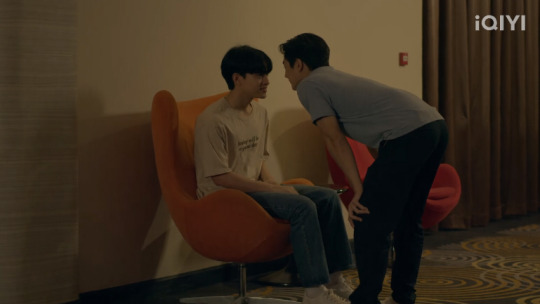
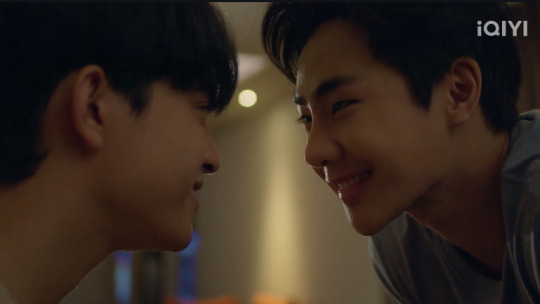
There are several interesting points here. Phee is standing and bending to Non's level, Non is acting cute and waving his hand like a child would ; the groundwork of their relationship is laid down. Phee is the one taking care of Non. But what I found truly noteworthy is this :
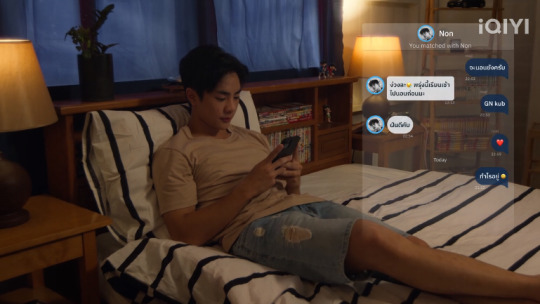
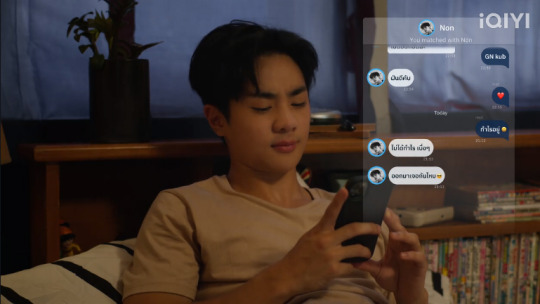
"Do you wanna meet up ?"
Phee is taken aback by Non's suggestion. He clearly didn't expect him to do that. Except you don't have expectations for strangers or vague acquaintances. By that point, Phee and Non have been messaging for long enough for Phee to know Non quite well and for the both of them to smile like idiots upon meeting. How long exactly ? Nobody knows.
Two : perfect date and the start of a series of promises
Three or four shots of a traditional, happy date, what more could we ask for. Genuinely. Sad Non, abused Non, crying Non is brought back to a softer world. He earned this level of cliché and happiness. There's also the pinky finger promise ; that's what interests me the most, not as a singular instance but as the start of a pattern. Promises are a running theme in Phee and Non's relationship. As willing as Phee is to take oaths, he's quick to fail them -hell, just one episode prior he wasn't here for Non and it resulted in a suicide attempt. The situation with Keng isn't Phee's first failure.
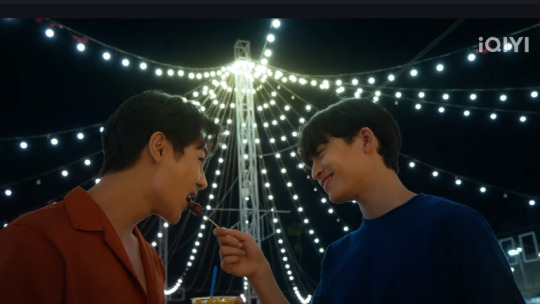
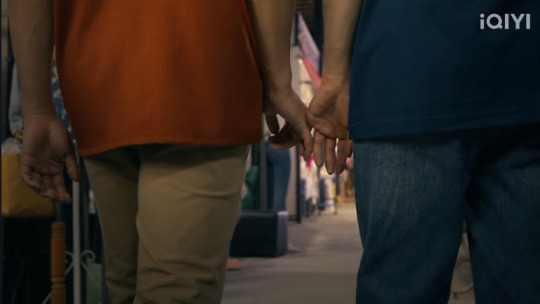
Three : Non's home
Here Non is letting Phee in his home, his room -his life. And he does so with glee. We've seen beforehow Non tends to keepto himself. Jin has to try a lot and try hard to get him to open up a bit, so whatever happens here is meaningful.
Phee taking his manga from Non could be read as them not sharing common interests (unlike Jin, my imaginary public argues with a nod). I personally saw it as them being comfortable enough to do their own thing while sharing space, until Phee got bored. Or horny. Or both. No sex scenes are shown, which has to be intentional. Phee gets a graphic sex scene with Jin, Non gets a graphic sex scene with Keng -but none for Pheenon. There's enough suggestion that the audience will get the idea, and I haven't pinpointed what lies behind that choice, but it's definitely there. They go back and forth between tooth-rottingly cute and buying a house in the bone-zone.
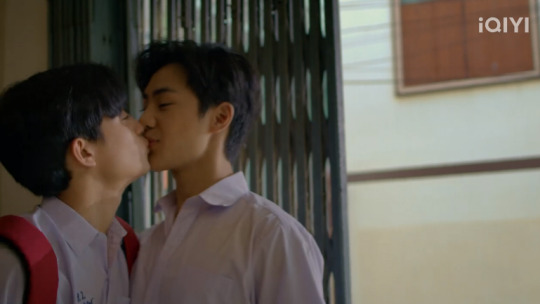

Four : being each other's whole world
They're both giddy and running to find each other. Their families don't understand because they haven't told ; it's their own little world (and in Non's case probably his only happy place with no worries).
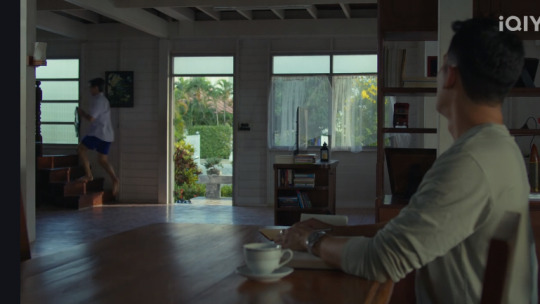
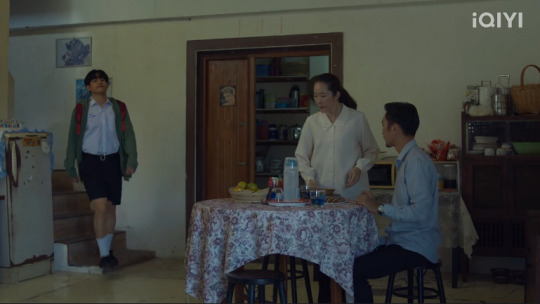
Five : the kiss scenes
The sensual aura that built up in all previous scenes reaches its peak here. Once again nothing is shown in terms of sex, yet you can feel the physical attraction just as well. I might be getting off the rails by saying that while they're honest, they also virtually keep things private. They show us the truth, but an amputated, rushed one.
Just like I suppose Phee gives Jin an amputated and rushed version of what happened.
Six : The river
Ah, yes, the river scene. I won't be talking about the longer one with the bracelet yet cause it's separate from the little glimpses we got so far (it has dialogue, for one). But this ? This is gold to my brain.
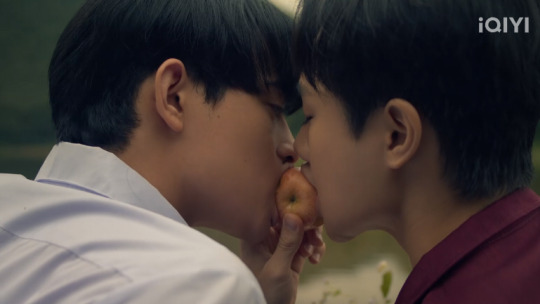
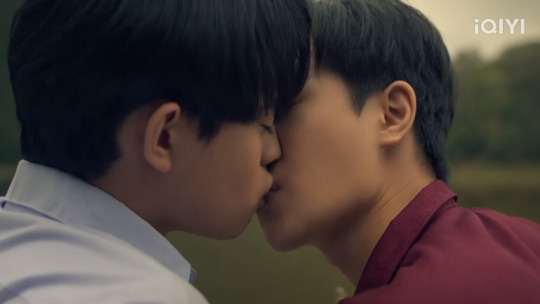
An apple. Not only are they both biting it, but Non's eyes are open and staring right at Phee, while Phee's are closed. Non is holding it too. Now I know the apple symbolism is a Chrisitian one and we're in Thailand, but that little detail struck me as odd when Phee and "Tan" were introduced :
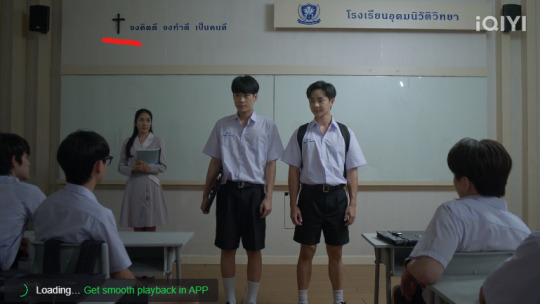
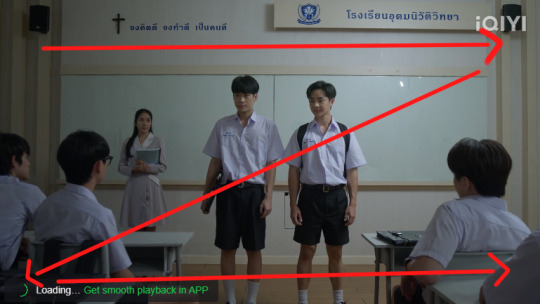
We're entering full clown territory cause the cross was probably hung there like the curtains are probably just goddamn blue, but I added a badly drawn plan of how our brains read images, starting from top left corner (where the cross is) to skim over the middle in a downward axis to the bottom left (Fluke, Jin, the more innocent ones actually I just realized) and then to the bottom right. The cross is what we see first.
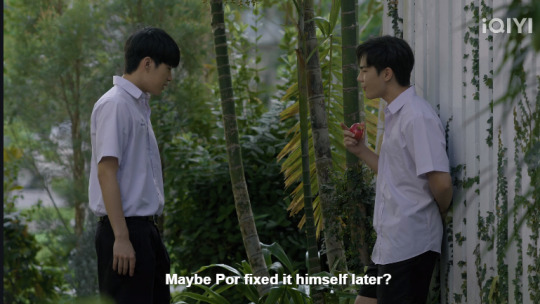
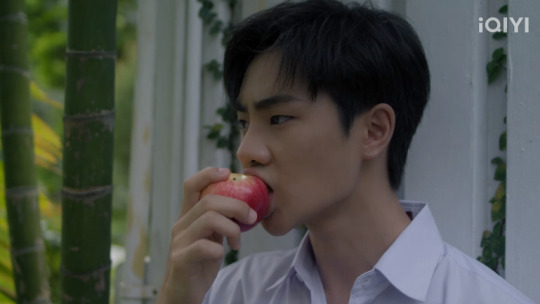
And then, wouldn't you know, our lovely apple comes back as New and Phee are discussing the boys -and where New is out to get them, Phee is already giving even Por the benefit of doubt. He's also keeping his left hand behind his back. I'll get back to Phee's left hand, but the apple comes first.
If the cross is any indication, and that we get two apples, then the first one that's set in the past, a flashback in a flashback, could be the Old Testament version, a fall from heaven ; and the second one that Phee is eating by himself, not blindly this time, could be the New Testament version as redemption from the original sin. Not to mention the greenery around them, almost like a garden.
"But then doesn't it mean that Phee, after falling for Non, starts to get redemption for failing him by saving the boys from New ?"
You know what, MAYHAPS. It could work, I guess. But same as the manga reading scene, it could go many ways. I personally think the redemption he longs for is redemption for having let Non down so badly. Besides, I don't think New is ready to kill people yet in that scene. He's just trying to gather evidence for now, and Phee knows it. So why defend those boys ? Jin I could understand, but Por ? And protect them from what, exactly ? Getting justice served and truth exposed for something they actually did ? If they're innocent, what's the rush in getting New to let go ?
Why wouldn't Phee be trying to keep New safe ?
Look it's not that far-fetched I swear. First I'm going with the fact that Phee knows Non is alive and got in contact with him somehow. One because I stand by my words, this is a face that calls for murder.
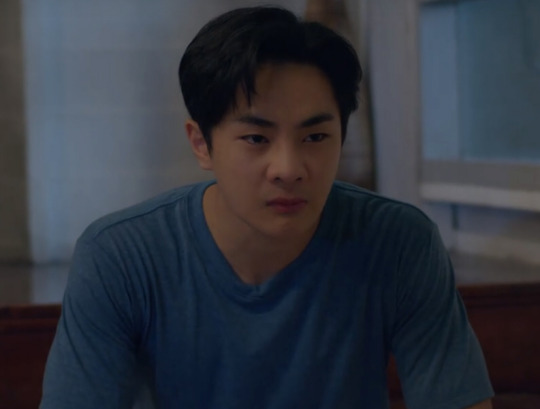
And two, the ring tattoo. I don't think it's a continuity error. And he just so happens to keep his arm hidden behind his back when trying to stir New into giving up on his search. As a sign he's actually carrying on Non's wish ? I'd love that.
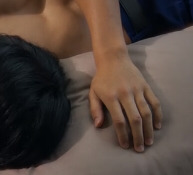
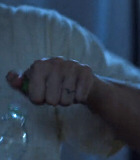
Then someone in the group has to be in contact with the masked man, the ninth person, or else they wouldn't have known when to expect the group. Unless they literally live in those woods, which is also possible.
There's also a long post I'd started about how the show always plays by the rules, not even trying to be surprising in the decision it takes (A guy dying early on in a slasher, Phee being Non's boyfriend, Tan being New, both of them being part of the scheme) but pulling the rug off under our feet in the execution (no one else of importane having died after Por, quiet Tan being the one to murder people while decisive Phee is crying about, etc). Which gives me the feeling that it will be the same here and that Phee is much more of a mastermind than he's been whining on to Jin.
Speaking of Jin, it would also explain why Phee has been investigating him specifically. They might have been trying to determine if he'd done anything, had leaked the video or not. When push came to shove, Phee played the honesty card to get him to confess. And. He. Did.
Not to say Phee doesn't have genuine feelings for Jin, and that it doesn't make him feel torn and confused. But the fact that they banged right after Jin reminded him of Non more strongly also isn't something I'd ignore.
Anyway, I'm getting tired, short version :
Tl;dr :
I think Phee and Non's relationship was actually much stronger than we've been shown, that Phee knows Non is alive because he's the only person Non would have contacted and works with him. He was tasked with keeping New away from all this because Non doesn't want him to get hurt, but also doesn't trust him enough to tell him anything (remember that New was defined by his absence prior to Non's disappearance, only there to serve as a hurtful point of comparison, and that he wasn't close at all to Non to begin with, regardless of how much he regrets now ; I don't think Non factored New would go that far for him in his plan). The revenge plot is already underway for Non, and Phee is trying to keep things going the way they should.
Here it is. It was itching my brain and I slept very badly because of it, but I AM NOW FREE.
#dead friend forever#I don't know it was running in circles in my head#especially after seeing so many people boo Phee after ep 10#It got my brain going 'hmmmm ain't that just too easy'#cause everyone seemed to think it was too easy indeed#it could just be Phee being a little stoopid yes but come. on.#what am I supposed to do with my braincells if I stop at that#dff the series
67 notes
·
View notes
Note
Thanks for your posts and metas, @neonscandal .... Before I found your blog, actually I ship tododeku and kiribaku. But thanks to you, I became bakudeku shipper (until now). Your metas are amazing and always based on canon. Sorry, I'm not good with words, but I hope you know how great your blog is (you are definitely one of my favorite tumblr blog). 💐🌷
And WOW these last 10 - 15 chapter, really are the best. Even my mutuals who are anti-bkdk can't deny Bakugou and Midoriya's bond anymore. Also, love Uraraka and Toga's bond....
Do you think it's possible that at the end of BNHA, Bakugou and Midoriya have ambygous relationship (kinda like Tiger and Bunny)....? I know it could be hard to be canon in shounen series.....
P.s Do you think SatoSugu (from JJK) is queerbaiting?
⚠️ Vague spoiler warnings through chapter MHA 410 at best. Covers JJK S2 with a vague mention of a character who pops up later in the manga.
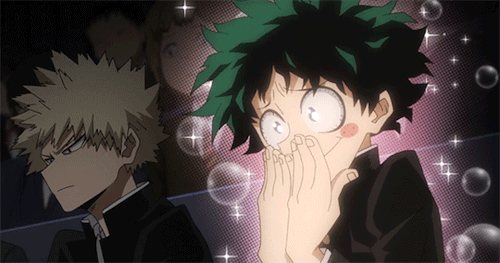
It's funny you say that because I also love a good tododeku or kiribaku situation. Like yea, people have their OTP but... realistically? Characters should be just as messy as people in real life. ✨ They're going to date around before things fit together with that OTP, right? At least that's how I look at it. So I love exploring offshoots.
You are far too kind in these rough times but I appreciate you saying that (and reaching out). The swarm of asks lately have been so funny. I tend to carve out time to address them quicker than some of the other things bouncing around my head (literally, the exact opposite happens with fic updates 🥺) so I'm just happy I'm writing something. If someone else enjoys it then that's the whipped cream and caramel on my sundae.
DUDE. I hadn't read 409 or 410 yet because holiday chaos but I feel like we're beyond allegations at this point haha ALTHOUGH, I didn't see the cliffhanger from 410 coming at all so I wonder what that means for the larger story.. Got any theories?
Regarding endgame... honestly the last two chapters gave me a little anxiety. "This is our tale?" Too good to be true. Especially when we know from chapter one "this is a story of how I became a great hero". Also, I've had some thoughts since 406 about how their connection is being framed up which I haven't had time to write but it feels like a lot of fanservice for Horikoshi (and subsequent editors, etc) to not commit. Additionally, in all the ways this story subverts the typical formula for shonen, it would also feel like a fumbled opportunity to turn everything on its nose with such a wildly popular series. So I'm holding out hope but conservatively preparing for one of them to just... not make it even if we get a confession *shudders in Supernatural flashbacks*.
I hope this makes sense as I struggled to recommend stories where this wasn't the case when asked about BL. In my opinion, good representation in mainstream stories (gender identity, orientation, race, religion, disability, etc.) is when, whatever makes a character different isn't their whole identity. Specifically in the context of more traditional stories (not centered on BL for instance), they should be involved if not just as integral to the plot as any other character wherein their diversity isn't sticking out like a sore thumb. But even that characterization requires nuance which is what makes it so hard to articulate? Maybe it's simpler to say that their character arc shouldn't just be based around identity. As a short answer to your question, I don't think that SatoSugu is queerbaiting. I think they are authentically and intrinsically coded to one another in subtext and out loud straight from Akutami but that, sometimes, relationships don't work out or love is unrequited. They may not have had the same feelings despite their inherent complement to one another and that's okay.
As above, characters should be just as messy as real people and that's what makes what didn't happen between them all the more tragic because it's heartbreaking in how relatable it is (not the cult leading and murder though). Seems like a convenient answer from a delulu shipper unless you take into consideration how Kirara Hoshi's identity is given the same level of subtlety. They aren't defined by their identity nor are the characters jarred by some particularly grandiose reveal nor are they perturbed by the nature of their connection to Hikari. I'm by no means an expert but I think that these characters are executed well in the sense that they have a complexity that doesn't hinge on what would otherwise make them different. They aren't "othered", it's just a fact of who they are and the story continues. It's a facet of who they are without cheaply being all they are. With Gege Akutami's own pronouns not expressly confirmed, perhaps that informs the care around those with differing identities.
I haven't seen Tiger & Bunny yet but now I know what to check out next!
#neon asks#anon asks#deku and kacchan#we are the strongest#bnha#mha#jjk#boku no hero academia#my hero academia#satosugu#stsg#bkdk#ktdk#dkbk#bakudeku#dekubaku#katsudeku#anime#manga#izuku midoriya#katsuki bakugo#satoru gojo#suguru geto#kirara hoshi#deku#kacchan
21 notes
·
View notes
Text
LJS Important Canon events: Train Accident and the aftermath: Jigens Timeline
It should come as no surprise to anyone at this point that I am absolutely in love with the Koike Films and The Woman Called Fujiko Mine.As someone who enjoys a more "adult" tone to certain media's once in a while, the Koike films and TV show just hit a little different to me when it comes to the Lupin series, edging towards the more dark tone of the manga, without ever actually pushing completely into territory that made the first editions of the Manga so infamous.
As a result of my love for the series as a whole, it should also come as no surprise that me being me would find some way to combine certain Lupin media into my own "timeline" to work off.
Enter my favorite and most greatest achievement in the fandom thus far:
me somehow merging the Lupin Zero's timeline with the TWCFM's timeline.
Now granted it wasn't easy. But one of the things I truly appreciate about this fandom, besides the fun characters, is that it helps with it being nearly 60 years old at this point, with it having a lot of focal points to jump off at.
For me the timeline starts not with Lupin Zero itself, but what comes after. But instead basing it off of what came before Zero.
The Train accident is one of the most “legendary” albeit-not-really-explained-or-even-mentioned-much-if-not-at-all-idea, to come out of the Lupin fandom next to the Is Lupin even human idea. This incident is the one that famously yet “supposedly” scarred up Lupin’s face and ultimately killed his dad.
We often get "hints" of this incident but never fully do we ever get concrete evidence of it. Not even the infamous "Mask Scene" of Pt5 seems to directly hint to it.

In my AU however, this is actually a really important event. Basically the highlight of the entire AU so to speak. With this incident, a lot of important events transpire that open up to other media forms canon to the AU.
The most important one being TWCFM, as well as the Tomoe Arc.
How?
Well, you see, despite Lupin’s attempts at acting like everything is OK shortly after the train accident, both Issei, but now also Jigen as this idea incorporates Lupin Zero, begin to notice that the boy isn’t as “ok” as he lets on.
A while after he heals, he begins to show the classic symptoms of severe depression: he’s often times lethargic, sleeping all day, he’s losing weight to a point where it becomes noticeable, is often times irritable, but one of the major things that entails the possibility of something being severely wrong is that he begins to lose interest or at least the pleasure in engaging in certain activities.
He no longer comes up with wild hair brain schemes, he no longer builds fancy gadgets, he no longer does anything that he is known for. And while Jigen likes the slow pace in the beginning, as it goes on for longer then he anticipates, he ends up bringing up his concerns with Lupin’s grandpa who also notes the same changes in his grandson that Jigen has noticed as well.
As the days go on and Lupin gets worse and worse to the point he’s practically a shell of his former self, Issei ultimately makes a choice. Something has to be done before he loses his grandson to his spiraling.
But what?
In the end we all know what happens.
With no other options that have worked including therapy and worried deeply for the safety of his grandson’s mental and physical health, Issei brings little Lupin to meet a lady who teaches not far from where they live in Japan, who has agreed halfheartedly to help bring the boy some peace.
This woman is named Tomoe.
Well. . .we all know what happened with that.
Following Lupin's disappearance and supposed death, Jigen and him are separated for many years.
Which opens up to Jigens TWCFM Arc.
While I don't know what precisely goes on with Lupin during the time-frame of their separation, Jigens timeline merges both manga and show elements as well as Koike Elements.
Some time after returning home following the loss of his friend, as he is unable to cope without him, Jigen returns to the old bump-grind life he had before he met Lupin. He goes back to work for the mafia and his father as a mercenary once again, rising up in the ranks as a remarkable hitman. But it’s a large tragic occurrence, with every bad thing that can happen to him happening to him, his life falling apart without Lupin to be by his side.
Some of the major turning points include:
The kidnapping of his youngest sister, and the death of his brother in the same event when he was in his late teens. Following the death of Joey Dunn, Jigen is pushed harder by his father to "carry on the family business. However this is a tumultuous event as it leads him to proceed with an attempt at a full mercenary career. Because of his background, he becomes a mercenary who went to South America and befriended Gallanco, whom he admired. They both went to Dolminea to fight in a war; the image of Gallanco becoming a hero left a deep impression on Jigen. At some point, he returned home, but due to events unknown to outsiders, he ends up relocating to Europe and joined the Italian mob; although the reason is unknown, it is thought to be at the behest of his father, who still attempts at using his only living son as a way to carry on with the name and all that, thoroughly abandoning the thought of his youngest being at any means useful thus casting her aside.
The Death of his Father can't come quickly enough. But when it does, it throws Jigen for a loop. He fully expects with his fathers death to leave the mafia for good and go home. But with the life now embedded deep in his bones no thanks to his old man, he finds himself unable to do so. Believing himself to be no good at anything else other than mafia/mercenary life, he lives in self-exile from the family, cutting off contact with his mother and sister for a few years.
However, this turns out to be a terrible idea, as while in the Italian mob, he grows close to his boss's wife Cicciolina. His boss eventually catches wind of this, and tries to kill Jigen, but is accidentally killed by Cicciolina instead when she tries to stop him. Following a series of event's later, including his first interaction with one, Fujiko Mine, Jigen becomes a unwilling participant of Cicciolina assisted suicide. Fed up with everything, he decides once more to become a thief for all times sake.
Which leads to the most important part of Jigens TWCFM arc:
The Reunion between him and Lupin.

The reunion between Jigen and Lupin happens in Episode 05 of The Woman Called Fujiko Mine: Blood-Soaked Triangle. Following the same premise of the original episode: Fujiko and Lupin, and later Jigen, go in search of a jewel peacock at the bottom of a booby-trapped pyramid in Egypt.
In LJS, Jigen, with his life going absolutely nowhere fast, decides to attempt a life once again of thieving, desperate to find some direction or traction in his life. Halfway through traversing this gruesome pit of horrors, he comes across a familiar sight.
Now up until this point, Lupin spent much of his time actually trying to track Jigen down. But because of his change in lifestyle, Jigen basically dropped off the grid. So when Lupin is discovered to still be alive some many years later, Issei sadly had no way of telling him about the potential whereabouts of his childhood friend. It would only be by chance that he would run into his old friend nearly a hundred plus more feet underground.
After playing a few Lupin tricks on his buddy, as he’s always gotta play some game with people Especially when he notices it’s his best friend who he hasn’t seen in a long while:
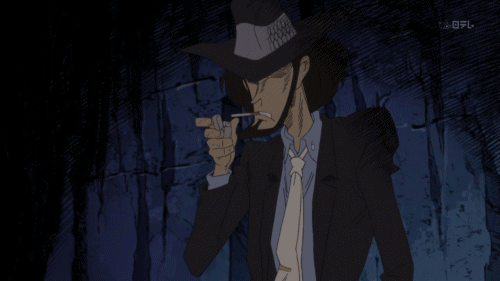
Lupin eventually reveals himself to Jigen
However, Jigen, whose sanity up until this point had been holding on by a measly thread, assumed that Lupin was an illusion, more so a ghost. And because Jigen is scared of Ghosts, his first instinct when scared was shoot. However in typical Lupin fashion, Jigen missed and Lupin is more insulted then appalled.
"Why'd you shoot at me?!"
"Cos' you scared the shit outta me! I thought you were a friggin' ghost, man!"
"YOU CAN'T EVEN SHOOT GHOSTS!! The bullets would go right through!!"
"Oh, yeah."
Upon realizing just who exactly he is talking too, the pair embrace like old friends. And in typical Lupin Media fashion, there is nothing like a classic, ridiculous, goofy-ass tomb-robbing scenario to jump start reigniting your relationship.

Especially when you guys nearly kill each other the first time.
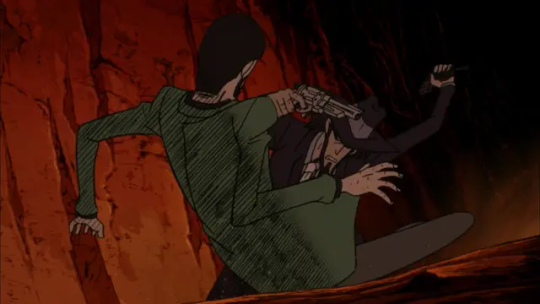

Following the events in the Pyramid, Jigen attempts not to leave his old friends' side, fully intent on figuring out just Where in the hell Lupin had been this whole damn time. It's around this point however, that Jigen begins to notice that despite his wacky goofy nature still going strong, that Lupin does not appear to be himself anymore. He's more tight, serious, an odd personality he doesn't remember his old friend ever having.
As the day's go on, Jigen begins to also realize that while life doesn’t go back to the way it was when the boys were younger, and that it never would probably.
It does get somewhat better

In the beginning, things do end up being weird between the both of them because it had been so long and both of them don’t know how to talk or interact with each other cause both still don’t know how this could be happening after so many years.
However after small heists together, things begin to fall into place. Before the dramatic climax of TWCFM's final episodes, Lupin attempts to ease Jigen back into the partnership with small heists.
The most important being when Lupin asks for Jigens help on a project, because it’s a big big job and he’s still hard of seeing because he has no sight in his one eye, which by now he basically gotten rid of and replaced with a glass eye, and his other eye is only as good as his contact lens. He needs Jigens help and it ends up being their first true series of heists the pair do together.
Jigen soon finds out that this project is a new, functioning prosthetic eye, that Lupin has built with the tools and items Jigen has helped him pilfer over the last few weeks. It’s top notch, highly sophisticated and it fits perfectly in Lupin’s eye socket.
Following the end of TWCFM's storyline, the pair are not far from each others side.
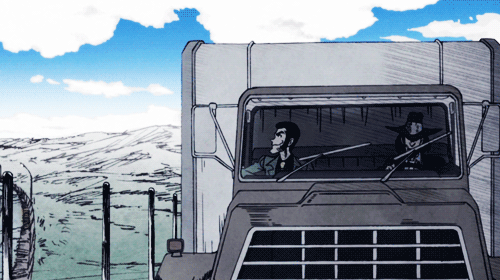
Then Gravestone happens.
Gravestone is canon in my Ljs series because it's premise is suppose to stick as the final trust exercise between Jigen and Lupin after their reunion in the Pyramid to cement their partnership to the highest form it could be. The final nail in the coffin so to speak, solidifying their old and new partnership so to speak. Putting each others life and trust in one another where uncertainty grows.
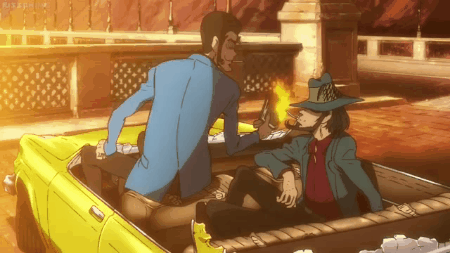
The rest was simply history
#lupin iii#lupin the 3rd#daisuke jigen#jigen#jigen daisuke#arsène lupin#lupin the third#arsène lupin iii#Lupin III: The Lavender Jacket Series
21 notes
·
View notes
Text
Heavenly Delusion Episode 11: New Territory
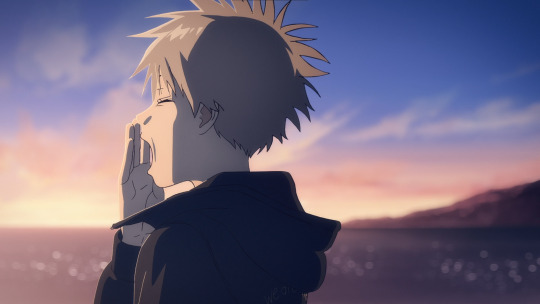
It's with this episode that we finally surpass the official print release of Denpa for Heavenly Delusion, and cruise into new territory with the anime for English fans. It surprised me, but I can totally see what they're going for with how they're restructuring events, and I think it works amazingly. The feel of terror and discomfort is really on display with this episode.
Though we don't start with that right away. We actually get a bit with the academy before the opening, and I'd just like to point out that in this scene you can see a new child with similar ears to Mimihime. Nothing special, but it puts into perspective that the mutations amongst students are similar in some cases.

Anyways, the opening comes and goes, and we return to following Kiruko and Maru as they continue their journey towards the goal of Heaven. I wouldn't say there's anything special about their drive, as it's a lot of work that we've already seen, so I'll just glance over it to this scene with the director to draw the pair together.
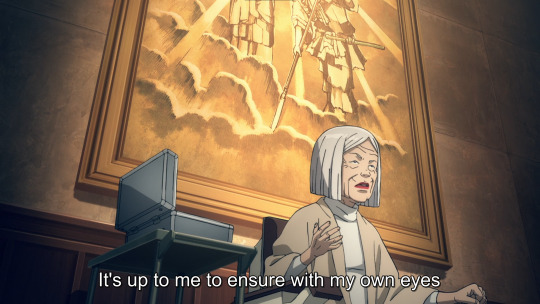

So I think the very first thing to note here is that everybody is reaching for "Heaven", but for different reasons. Maru's goal is to reach Heaven, while the Director's is to achieve. Similarly, the director does so for self serving purposes, while Maru has been set on the path towards it. Overall, I find it very interesting how this scene sets the two characters at odds.
Also, for those curious, the portrait behind the Director is of Izanami and Izanagi, effectively the heads of the Shinto religion that preside over life and death. It's really cool seeing an anime lean into that side of mythology and religion rather than to default towards something else. Anyways, the point of this being, that by placing Izanami and Izanagi behind the Director, they're effectively telling readers and viewers that the Director wishes to preside over life and death itself (if that wasn't clear already).
Moving past the Director's monologue that explains Takarahara Academy a little bit, I really like what they've been doing with Sawatari to start off with Tokio and Kona's child. In all of the scenes we have of Sawatari looking over it, we have yet to see Sawatari's reaction to it.

Though shortly after this, our time is up with the academy for now as we move back to Kiruko and Maru. I've been really liking how well they streamline a lot of these events, as they cut and (most of the time) paste pieces in different spots, trimming the fat in the process. I wouldn't say there's much of anything wrong with the manga, but that the anime is repurposing this story to be presented properly in its best form as an anime. Anyways, the point I was getting to, I really love the framing with these window shots. Even better is that in the shot where Maru sees the smoke, viewers aren't shown it until it can be placed naturally in the scene. It's a small detail, but it works wonderfully with Hirotaka's direction of the series.
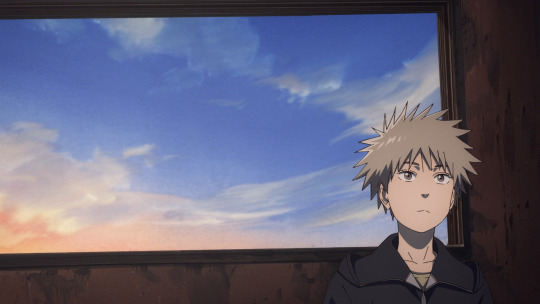
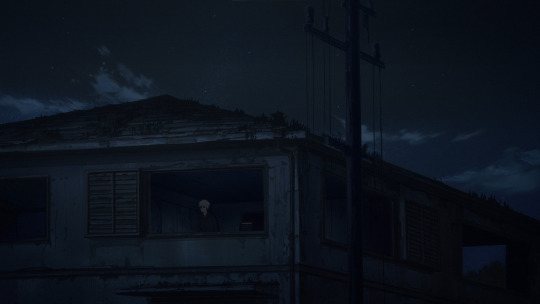


And it's here that we get our massive reveal. The Ibaraki facility, and Inazaki Robin. I never really thought about it before, but Inazaki and Ibaraki have a bit of a ring to it. Same with Inazaki and Izanami/Izanagi. Doubt there's much of a connection, but just something that caught my attention. Anyways, what's more concrete and interesting, is how gaunt Robin looks in this scene. It really makes you wonder about what's changed with him until this point.

We don't linger long on Robin or Inazaki though, as we return to the academy to find Mimihime trying to help out another girl. I'll be straight, when this happened in the manga I thought it was for real and a part of the whole bodysnatcher scheme somehow. And that feeling translates incredibly well into the anime. The terror, the fear, the horror of those precision tools meant to tear her apart slowly encroaching on her. It's incredibly well done, and I love what they add to it. That piece of all the flashes of equipment and stuff is new to the anime, and I think it's an insanely good touch that shows how Mimihime's foresight becomes a detriment to her and something that she fears. What's happened in the future that she's seen haunts in her the present and creates phobias from thin air.
And just to add, because it comes up later as well. The sound design and OST? Impeccable in these moments. That rising tension, the rhythm that it produces with that very low and solid drumming. How it pauses and when it speeds up, the relentless pressure that it provides upon the scene. Just all around great work.
Did you think Mimihime had enough with just that one round? Of course not! She's forced back into more when she meets Kona on the other side of her curtain. I really like how they've used Mimihime's character so far, and pulling from volume 6 to bring moments like this closer together with one another is a great idea for the anime. The added pieces from Mimihime's earlier hallucination go hand in hand in her foresight that reveals Kona as a Hiruko.
I also love the details here. Mimihime is looking away from Kona/the Hiruko, and Kona's Hiruko version starts to loom closer to her so she shies away just that little bit more.
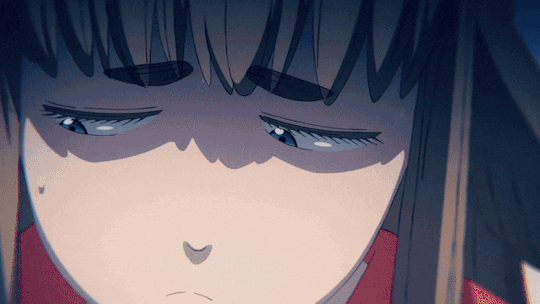
Anyways, it's not all terrible for Mimihime, even if she has to experience that hallucination once more, because she does it in the name of the young girl who can't be friends with anyone because of her ability. I do find it quite interesting though how they set it up between the person that's used to having hallucinations, and the one that causes hallucinations.

Alright, just a few more pieces, I promise I'll fly through em to make this one short since I drew the previous episode out so much. Aoshima and Sawatari are working together to plan to get Tokio's child away from the Academy, and I like how they stand on opposite sides of the painting. It could be that rather than reign over both, they each represent a side between Izanami and Izanagi. Or it could be that they both exist outside the director's desire for a Heaven. Regardless of that, I find it really interesting that it's only in this one scene that we see Sawatari taking care of Tokio's child that we see their facial expression and hear them talk to them. Especially because they go through the trouble of showing us that they've fed both the babies that appear in this scene.


And I find this really interesting. One is labelled Tokio Jr, while the other is labelled Jr. C. The very first thing that popped into my mind was that one of the two babies is to be used to swap out for Tokio's child when Sawatari and Aoshima attempt to get it outside of the academy, but I'm not too sure.

Now, the last real piece to talk about is the "test" being undergone at Takahara Academy. The up and mention the word Hiruko to the kids, and that sets all of them off. Not freaking out or having some crazy realization, but in a more, "I don't feel right and this doesn't feel right" way. I already talked about how good the horror is, but what about the foreshadowing? When they mention the word Hiruko, the characters we know of are only ever shown in pairs. And thanks to Mimihime, we're able to establish a pattern. We know from Mimihime that Kona becomes a Hiruko (though he's not shown with Tokio, and Tokio's only shown at mention of "outside of the outside"), and we know from previous episodes that Mimihime will turn into a Hiruko. So what do you think of Taka and Anzu being shown together? Probably the same thing I am, that one of the two of them will turn into a Hiruko. I think it's a really subtle piece, but an incredibly interesting and important one. Why does only one person in these pairs turn into a Hiruko? Why is it that these pairs only form romantically? What about Tarao?
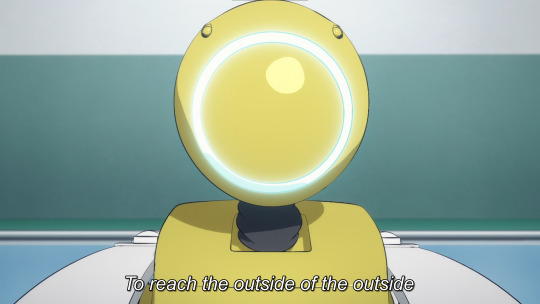

This episode works wonders on all fronts, shifting material around and condensing it to play right into the horror and discomfort of an unavoidable future. Just as those countless tools closed in on Mimihime in her hallucination, the walls are closing in on these children, time is running short for Sawatari and Aoshima, and Kiruko and Maru close in on their goals. It's incredibly well organized for translating this impressive story from manga to anime, and I absolutely can't wait to see what they do with the next episode.
#heavenly delusion#tengoku daimakyou#天国大魔境#production i.g#mori hirotaka#kiruko#maru#anime recommendation#anime review#horror anime#anime and manga#anime
27 notes
·
View notes
Note
This is a bit of an older thing you were interested in, but now that it's two years past, what are your overall thoughts on Mars Red? Do any characters or dynamics stay with you? Are there any bits from the show or the manga that you would point to as being The Good Stuff? I loved seeing your thoughts on it as it came out and now I hope that me being nosy gives you an excuse to ramble a bit
Hey! Sorry this took me a bit to answer. Overall thoughts...man, it's interesting to think about Mars Red two years after it came out. Which. Okay. I say this as if I ever really stopped thinking about it.
I think Mars Red was a fantastic 12-ep, contained story, with an ending that was satisfying enough that I wasn't frothing at the mouth for more and yet open-ended enough that it lived rent free in my brain. The cinematography was experimental for an anime and I think it paid for that in unpopularity but god, it was worth it. Choosing to animate Mars Red as a film-type anime with theater references that were certainly not as obvious in the source material was a risk but god it came out gorgeous. Like...I can't point to anything that does anything similar with the shot comp and subdued color palette.
It's also one of those anime where there's not a lot of talking or yelling and yet it's so...dense. Weighty. You watch this show and the weight of everything gone unsaid sits with you.
The grief, too. I'm a sucker for stories that are just drenched in it but never really address it by name, never look it in the face, just skirt around the edges of it in a way that colors the entire thing. Mars Red uses vampirism to talk about the grief that comes with losing people, with your life changing in ways you had never wanted nor expected, and even the country-wide trauma that comes with rapid modernization and change. Like. Violet Evergarden is about grief in a way that has the characters wrestling with it in full view of the cameras, howling and spitting and sobbing until they come out on the other side a new person. Mars Red is about grief in a way that's more like sitting in your bedroom, dissociating under the weight of it, and then going about your life even as it drags you down.
In that way, I think it reminds me a lot of Chainsaw Man? Or Chainsaw Man reminds me of Mars Red. Stories that don't say the horrible things out loud and yet you know they're there, stories absolutely pouring heartache, stories where the blood and the fighting is really about mourning. Maybe it's the twin film/theater influences.
The meta aspect of Mars Red can't go understated either. Defrott's position in the anime as a sort of outsider/storyteller who nevertheless has skin in the game lends the whole thing an almost make-believe touch. Defrott outlines the stage for the audience--here's the world, here are the characters, here are their motivations, here are their struggles. And this is where the stage ends. This is where the play concludes, these are the curtains, farewell and thank you for watching.
In contrast to the manga, which doesn't have Defrott in as nearly an interesting position, the anime's decision to have him as something of an outsider POV yet being inexorably dragged into the story by Aoi and Misaki both...it parallels the other vampires grappling with whether or not they're human. Are they human enough to participate in the narrative?
I genuinely love both adaptations, by the way. They're different enough that I love them for almost entirely different reasons. The anime has a fantastic handle on atmosphere and purposeful framing in a way only an animated adaptation can have, but the manga has the freedom to linger on things the anime brushes over. For example, you get a lot more development for Takeuchi and Suwa's friendship, you get a slightly different take on Aoi and Kurusu's romance, and you get. Well.
Maeda's manga death hits so much fucking harder.
Like his anime death was heartwrenching and the fact that Yamagami sacrifices his own life to try and save Maeda's (in vain, jesus christ) but. You can't beat the celebrated general, lauded as a badass in the universe of the manga and framed as an invincible machine respected by his men, dying alone. Ingloriously, in an empty hallway. And not by a fatal battle wound--no. He refused to take care of himself when he knew he had a debilitating heart condition and instead of staying in the hospital, he put on his uniform, crawled into the hallway, and died.
And he dies in the arms of General Nakajima, tells him to use his body however he can for Nakajima's cause. The ostensible villain's arms. So when Code Zero sees Maeda's body perverted into a robotic vampire's and they howl that he wouldn't have wanted this, that this was wrong and monstrous--
Nakajima gets to say that no, he gave me his permission. He consented to this. It's awful, it's heartbreaking, and when Yamagami sacrifices himself to put Maeda out of his misery in Maeda's first and only moment of lucidity as a vampire, it hits like a fucking truck. Tempura still makes me tear up sometimes. Like. Holy fuck. They loved each other, they really did, they loved each other so much it saves them in the only way it could.
I'd have to write another ten pages to talk about everything lovely and beautiful about Mars Red (I. Might. Later. LMAO) but I just wanted to say thank you for giving me the opportunity to ramble :) it's so sweet of you and I hope you continue to enjoy the vampire lads with me!
15 notes
·
View notes
Note
I’m curious, what’re your problems with the Zenin massacre? Cause personally that arc almost made me drop JJK
First, there was a lot of setup for pre-culling game arc that we were going to get a closer look at the politics of the Jujutsu World. For instance, Megumi inheriting the Zenin clan, and the Jujutsu High declaring Yuji and Yaga targets for execution could have shown us the complex politics at play with both the old families and the elders at Jujutsu High something we are constantly told about but not shown.
The three clans are also very plot important characters, as well as the elders, they're part of the worldbuilding and drviers for the plots and several characters backstories but we know practically nothing about them. We don't really know the internal workings of the Zenin clan, the rules, who is in charge, what their beliefs are, and what little we do learn comes from manga bonuses and not the story proper.
Jujutsu Kaisen if it took a break before the culling game arc in the aftermath of Shibuya, had a chance to demonstrate one the corruption of the jujutsu society and how it made it impossible for them to adapt to Kenjaku's plans because of their own politics and infighting, and number two present a conflict that's not really solved with fighting, because Megumi becoming clan head was something interesting he had to deal with because he has been sheltered from the Zenin clan from Gojo all his life. The Zenin clan in particular features in so many character backstories, and we know that they are toxic but we don't really know how.
The whole arc however takes place in less than ten chapters and it is rushed, not only because we literally know nothing about the characters before they are slaughtered other than they are one note and evil, but also any potential further conflict the Zenin clan could have caused in the story is now null and void. What is the point of Megumi becoming clan head and the conflict that could bring, if they are all just dead now? It doesn't feel like the culimation of a plot line it felt like Gege cutting a bunch of plot threads at once because he wanted to make the story shorter. Mai is fridged for Maki's development, which relied on a lot of bad tropes like one, this framing of good victim and bad victim that wasn't there in the first place Mai practically tells Maki it was her fault she couldn't get stronger because "Mai didn't want to get stronger" Like Mai's way of coping was less valid somehow because she didn't want to learn how to punch bad guys.
The reveal about how Mai and Maki's powers worked relied on a lot of magic twin tropes. It does a disservice to Maki's character, because basically more or less she does what Geto did with Mimiko and Nanako and that is snap and kill a lot of people in retalliation for the abuse of one child. Except Maki doesn't really self reflect on it after the fact, and that mass murder is treated like a good thing because she was killing bad people to the point where people sometimes try to tell me Geto's mass murder is completely different from Maki's mass murder like that's even something that matters. Murdering a lot of people is still mrudering a lot of people.
Mai's arc is just shot dead, and Maki's arc feels really rushed because like Maki didn't really make any emotional change, or even overcome any difficulty, she just got a power up at the expense of Mai's death. If you are going to give this incredibly tragic end to Maki's arc with both her trying to prove herself to her family, and also her sister with her sister dying before they can ever reconcile and her being pushed into revenge then at least she should be showing the effects of that tragedy. Yet, Maki for the most part seems fine? Geto's killing of the village led to the final nail in his coffin for his mental breakdown. Maki for the most part is just kind of chill? She's working with the other kids in helping with the culling games.
It's a very dark turn for a story like Jujutsu Kaisen, and especially the conflict between Maki and Mai where it was being set up they might have reconciled or learned to work together and work out their differences, rather than one of them being fridged to give a power up to the other. Also. Maki's relationship with Mai was her main point of character conflict from the Kyoto Battle Arc onward, besides her overall goal of crushing the Zenin, and now they are both gone and Maki is just kind of... continuing? Coasting? Without any real goal, or desire, or character flaw, except the vague idea of wanting to get stronger. It destroyed more character development than it created, and like if you are going to decide to take this dark and tragic turn for Maki's character than at least the story should acknowledge it. Maki doesn't really act like her sister died and she just killed like fifty people in revenge, she's just sort of aloof and withdrawn.
Also, the Zenin are just boring because they are so unsympathetic there's like, no trace of humanity with them. In the Zenin massacre arc they basically exist to be wholly unsympathetic people who exist to be killed by Maki.
For a much better example of an abusive family structure, the Zoldyck assassin family literally torture their children in order to make them stronger, and raise them to be murderers even turning the siblings individually against each other and yet in the world of hunter x hunter they are interesting because they're not irredeemably evil. Both parents are both blatantly abusers and yet the story constantly remarks, the Zoldycks in general feel a bizzare mix of overpowering love for their children, and also possessiveness that doesn't allow those children to be their own people to the point where they feel too much love where the love itself they have for their chidlren becomes corrosive to their identities. Which is shown in not only Killua's parents, but also Illumi his older brother's attempts to basically control his whole life with the intent of raising him up as the ideal heir. And like, also they literally torture their children. But like the emotions present in the family dynamic makes that aspect far more interesting as an analog for a real world abusive family because there is a human element in how they love their children, and yet use them as if they are dolls or see them as extensions of themsleves to use as they see fit.
The Zoldycks are compelling is what I'm saying, the Zenins are not for all the importance the story puts on the political influence they have in the world and the toxicity of their clan they're just generically evil and then they're dead.
47 notes
·
View notes
Text
Fujimoto is definitely cooking with CSM pt.2 but at this juncture it's hard to tell exactly what he's cooking. I think it'll benefit a LOT from reading it all at once when it's completed, but keeping up with it week to week gives it a strange energy that feels very intentional. The way that every few chapters a different set of strangers smirks knowingly and is like "Heh... Well actually, we've been the ones doing shit in the shadows this whole time... The TRUE successors in the post-Chainsaw Man world. Accept our ultimatum, or, tch, well, good luck pal 😏" before getting completely fucking owned is pretty fascinating.
Maybe it's just because I'm me, but like, part of me wonders if this is riffing on the state of the world in the 90s and beyond after the cold war ended where there's been a long line of upstart groups all over the world trying to pick up the pieces and assert themselves in the vacuum left behind, usually basing legitimacy on claiming to be carrying forward a mythologized past--whether that be liberal nationalist, socialist, religious, fascist, or otherwise. With the number of times the ussr was mentioned in pt 1 and the East German crest on the astronauts in hell and the fact that the arc of pt 1 was basically navigating a world gripped by mutually assured destruction it doesn't seem entirely insane.
Not least of all because Japan itself has, to my limited knowledge, grappled in this regard just like anyone else. The socialist party, formerly the primary opponent of the ruling Liberal Democratic Party, dissolved in this time frame, a resurgence of nationalism and militarism and questioning of American influence, growth of neoliberal market-niche-as-identity, expanding religious/cult influence as seen in the stuff surrounding the assassination of Shinzo Abe, multiple generations of young people growing up with no prospects, the ramifications of rural depopulation on connection to heritage or identity... For as much as the country is viewed from the outside as strictly homogeneous, there's really a lot of struggling with national identity or direction, what it means to be Japanese and how to understand the country's legacy or imagine a future. And many of the competing forces refer to, again, some mythologized vision of the empire, how good the bubble economy was before it suddenly wasn't, rural culture and traditions, the radical movements of the post war, family values, and so on.
Or maybe it's just referential to manga in general, and how in shit like Bleach there'd be one after another super secret big bad evil guy that for some reason you'd never heard of before who is now the big focus! It's hard to say at this point, but I'm really curious to see where it goes.
15 notes
·
View notes
Text
Bachira's sequence in ep9 made more romantic than the manga version
It's here!!! It's finally here!!! Bachira's shining moment finally animated, and god do I have a lot of thoughts for it. I'll talk about Bachira's awesomeness in another post, but for this post I'll just focus on how bachisagi-coded the entire scene was.
I've mentioned several times on this blog how 8bit is constantly emphasizing character relationships, and that's even more clear in this episode.
In the anime, the emotional focus is entirely on Bachira and Isagi; whereas, in the manga, the moment is shared with their other teammates.
Example:
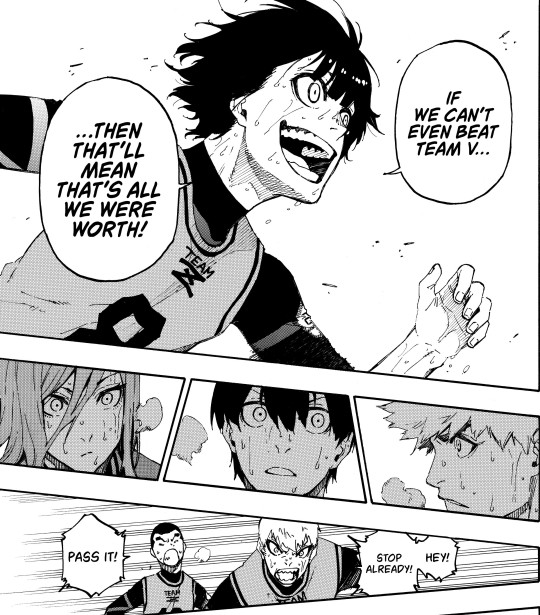
After Bachira's words, we have Chigiri, Isagi, and Kunigami presented in equal importance, followed by Raichi and Igaguri interrupting Bachira's monologue.
But in the anime, we got this:
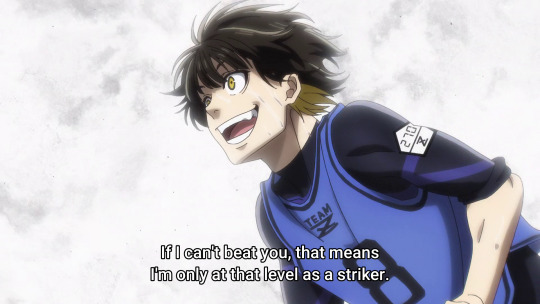
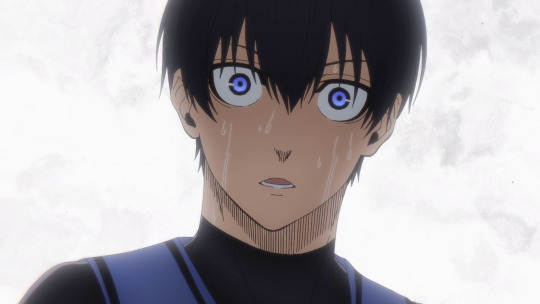
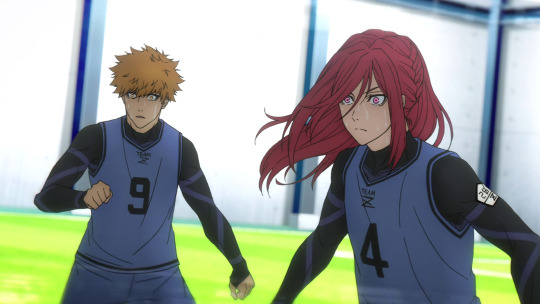
Isagi gets a whole frame for himself with a close-up on his expression, while Chigiri and Kunigami share one frame and are further away from us. Raichi and Igaguri have been cut out.
Bachira and Isagi are also sharing the same aura background, while the other two's background is still reality. The anime is really setting this scene to be something intimate between Bachira and Isagi. It's like they're telling us that the two of them are connecting in a way the others aren't.
And most notable example for this romantic push is definitely this scene:
(They're flirting, your honor...)
No, seriously, here's the manga version:
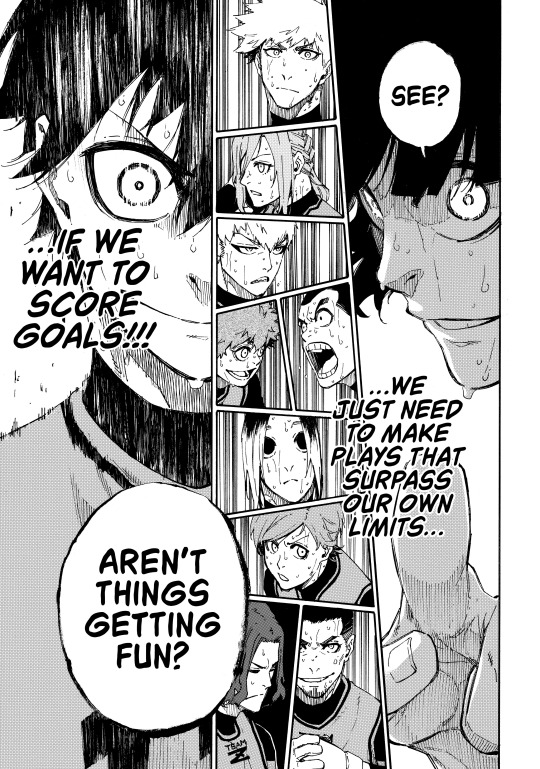
In the manga, it can be interpreted as Bachira pointing to the entire Team Z, but in the anime, it's like his eyes are only on Isagi.
And if you listen closely on the part Isagi appears with a smile, there's even a ba-thump kind of sound effect. Apparently, it's not enough for his eyes to sparkle; they must also let him go doki-doki 😂.
I'm guessing they added that little ba-thump there since they didn't add it earlier in a scene that should actually have it, which is this one:
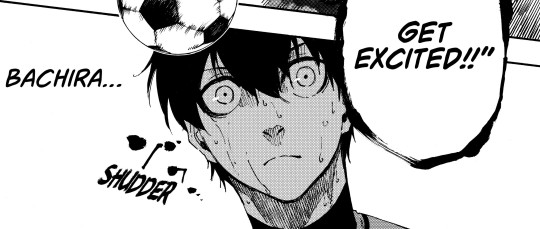
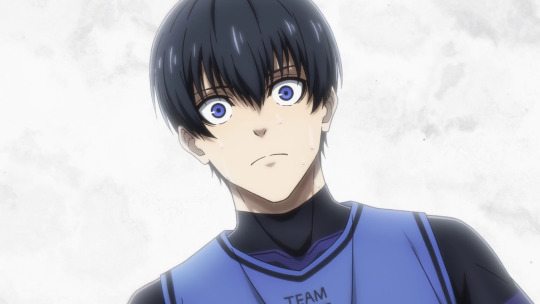
I prefer manga!Isagi here more, but I can see that the anime is trying to make Isagi's final reaction more impactful by saving his stronger emotions at the end.
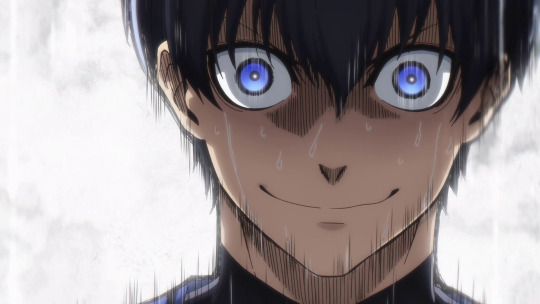
Special mention to this scene:
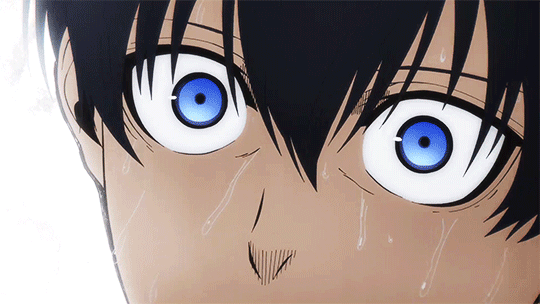
This obviously wasn't in the manga coz you can't do transitions like that on paper. So just the fact that the anime went so far as to include something like it really tells you where their priorities are.
The anime is really setting up early for the next arc, and not just for Bachira, but for Isagi as well. How they affect each other has been constantly highlighted in the anime, so I hope that when it's finally time for those scenes, it won't feel as abrupt like how it was in the manga.
#blue lock#bachira meguru#isagi yoichi#bachisagi#bllk#bachisagi supremacy#blue lock meta#episode 9#miyamiwu.meta#miyamiwu.src#anime vs manga
39 notes
·
View notes
Text
Got the inexplicable urge to scream about Cat Street (manga version) after so many years so I'm gonna scream about it like my life depended on it just because.
Attention for spoilers.
So, can I just say how sad any adaptation of the manga to other medium I found always fucks with it in some way? Some of the things I like most about the manga are precisely what's either changed or 'sanitized'.
So what's it about? Here's the most spoiler free version of it I can give you: There's this shut in former child actress teen. She had lived under a lot of pressure from her mother and then had something happen to her that made it so she felt incapable of acting due to trauma. And because she was rather well known, she was constantly being confronted by it, hence the shut in part. The story is about how she stops being a shut in and eventually goes back to acting and a building decorated with cat statues on the roof and with several quirky characters inside is at the center of it.
Now for spoilerish things that I like about the manga. It has what I call the 'obvious male protag love interest that she's totally going to end up with' character... but she doesn't actually end up with him. Like, the whole story he feels like the sort of guy the girl ends up with in any shoujo. There's also the other male character 'that you sort of root for but know she's not going to end up with because he's not shoujo protag enough compared to the other'. That's who she ends up with. What i like is that the romantic tension between those two in very on the downlow. like, you can feel they have chemestry and like the thought of them together but don't actually think they will. So it's very rewarding when they do end up together.
BUT that whole tension of the plot gets lost when you write away the 'obvious male protag' and replace him with a new filler character just so that you can focus on the actual male lead and hyping him up more. And I understand why they did that, but it ruins it for me. They whole point was that he wasn't the typical male protag, that there was a very obvious one that also liked her there but that she didn't have to end up with him. Removing the love rival and hyping up the end game to protag levels breaks the specialness of the whole thing. It was understated but it was theirs and that made it perfect.
Then there was what was my favorite moment in the manga that gets retconned immediately.
There was, back then, this preconception of 'female protags of a shoujo can never to any wrong. if they do it's by accident and they definitely got in over their head and have to get rescued by the male character.' sort deal. And while i can enjoy that to a certain extent, I enjoy far more female characters that are more proactive and actually do stuff and don't need to be rescued all of the time. The main character is a girl that is undersocialized due to being a shut in. that means the she is perfectly capable of going feral mode in defense of the very first female friend she makes in years that she can trust not to stab her in the back.
So picture this (and this is very spoiler of the scene in question): best friend in incredibly sad because she got rejected by the guy she liked over her aesthetic fashion of goth lolita. but that's not all. he and his freinds had gone out of their way to humiliate her. Now our girl is pissed. that's her best friend! she gonna get some serious revenge because she is that ride or die over it.
So, she studies the guy, see's the sort of girl he's into, uses her acting skills to lure him into going on a date with her, purposefully chooses a sort of isolated park and, when she feels like it's time, she humiliates him right back. but our girl isn't dumb, She knew he would lash out and retaliate. She was ready for him to retaliate. she called the cops in advance because she knew he would try to retaliate. she gets him framed for attempted sexual assault and arrested. Is it wrong since he didn't actually do it (arguably might not have even tried to do anything since the police interrupted him mid lashing out over the humiliation part)? Yes! But she knows that. She feels bad about it to an extent. She ruined his life over humiliating her friend. BUT at least it was something she chose for herself and she was actually smart about it from start to finish. Even the help she got from the police officers couldn't be categorized as damseling her because she planed that. She is the protag but she doesn't need to be a perfect innocent. it's actually more realistic that she isn't considering her past.
First friend that wont backstab her gets hurt unnecessarily? Feral rage more engaged!!!
After that she talks to endgame guy about it. she's remorsefull and needs to let it out and he's there for her. doesn't recriminate her or anything for her plan, just supports her.
What does the adaptation do? welp, clearly she's too innocent of the ways of the world to realize that it's stupid to confront the guy who had no trouble humiliating her friend in a deserted park at night. cops who? don't know her! Girl obvs too dumb to plan ahead for anything. Now let's make endgame guy be the one to actually call the cops after realizing her plan and rescue her at the last moment. Oh and because we can't make any of the lead have less than perfect moments, lets make the guy actually be a rapist.
why did they pic this manga to adapt if they don't like what makes it unique? That would be like taking Ed from FMA and changing any moment he is pure genius into a typical male shonen protag that only does smart thigns by accident, eats a lot, is eternally cheerfull and mostly dumb but with a ton of 'power of frindship' tossed in for extra shounen protag-ness.
so in conclusion. I like the Cat Street manga and honestly believe it deserved better. And I hope to re-read it once i have time for it amidst everything I'm doing.
#cat street#manga and stuff#manga adaptation#if you need to alter what makes the original special and different from the stereotipical of the genre why not choose a different one#if I wanted perfect lil miss shoujo protag theres a thouse other manga/anime i could be reading/watching#raj's rants
3 notes
·
View notes
Text
I truly do not mean this in a bitter baby copium way, please believe me, just. God knows I trust Horikoshi with a lot of things, but writing female characters in a satisfying way is not one of them, and I find it so frustrating that I have no idea what to think of what he will make of Uraraka. I've always had my grievances with him regarding this topic as it is (e.g. in her case: how she was sidelined during the Overhaul arc; how she hadn't had any major interaction with anyone except Midoriya for ages until the subplot with Toga was opened again; etc), and I generally go through the five stages of grief whenever I think about what I fear he might do with her, and this latest chapter… wasn't particularly encouraging… [the mentions of the romantic subplot part. The part about her, Toga, and Hawks being in the same place now is great, it has a lot of potential, and I really, really hope to not be disappointed].
Through Toga it has been stated that suppressing your feelings is self-damaging, through Uraraka it has been stated that it can lead to great personal accomplishments, and I have no idea how to conciliate these two things. The problem isn't that they can't exist at the same time, the problem is that within the manga the framing of it all does not seem to agree that this is ultimately true, or at least this is how it comes across to me.
Everything becomes even weirder when you count Midoriya into the mix too, because on one side he has never thought about Uraraka in a way that would set her apart from his other friends other than when he used to get embarrassed for having a girl in his orbit (which… is a pretty shitty way to set up a possible future romantic relationship, and not something that was exclusive in her regards either…), and on the other side he compared the way Toga experiences love to the way he experiences admiration towards All Might (with due differences regarding the radicality of their feelings)… I know that some people interpreted this as an indirect confirmation that in turn what Toga feels isn't actually love, but just admiration as well, except that:
We've known for quite a while that admiration is only part of it, not the primary focus (“Blood and admiration! Those two elements combined into something that society was never going to accept!”, “[…] just like how everyone kisses the people they love, when I love someone, I suck their blood”, “I wanna be even more like the people I love”);
“Danger sense didn't trigger because when she hurts people, she does so out of genuine, pure affection”;
When you have a character whose whole point is “society doesn't accept me for how I am, and I can't fit in even if I try”, I think it's pretty shitty to respond with “indeed, the main character thinking differently from her is a sure sign that she is a freak of nature wrong”, but maybe that's just me.
And again, this isn't a problem that exists in the real world because Multiple Things Can Be True At The Same Time. Hypothetically, Midoriya and Toga might thread similar lines but ultimately differ in how they experience things, but it all comes down to it: the way things are framed within the manga. Midoriya, Toga, and Uraraka are all entangled in this theme of admiration, but the differences are all a bit...... What confuses me the most is that while — to different extents — admiration and romantic love explicitly go hand in hand for both Uraraka and Toga, Midoriya… replied to Toga by using someone he doesn't love romantically as an example despite having been confronted about romantic love… I don't want to dwell on him too much because this post isn't about him and I don't want to open that door, but it's in moments like these that I wish I were a bkdk real truther™, because without taking into account what hypothetical romantic suppressed feelings he may have for Bakugou his role in this whole mess is… kind of incomprehensible to me.
Going back to Uraraka, I just wonder… if she were to suddenly backtrack on everything, what would have been the point of it all? There really isn't anything that would make me like the ending that she's likely going to get, aka some “I've decided that my feelings for Deku are good actually, and I can show you [Toga] what good love is supposed to be like” bullshit because it would not make any sense, again because of what such a thing would mean for Toga's character, and because I… just hate the idea of their fight partially being about who knows how to do love for a boy better.
Tldr. Girl help
6 notes
·
View notes
Text
Review: Don't Look Up (2021)
Don't Look Up (2021)
Rated R for language throughout, some sexual content, graphic nudity and drug content
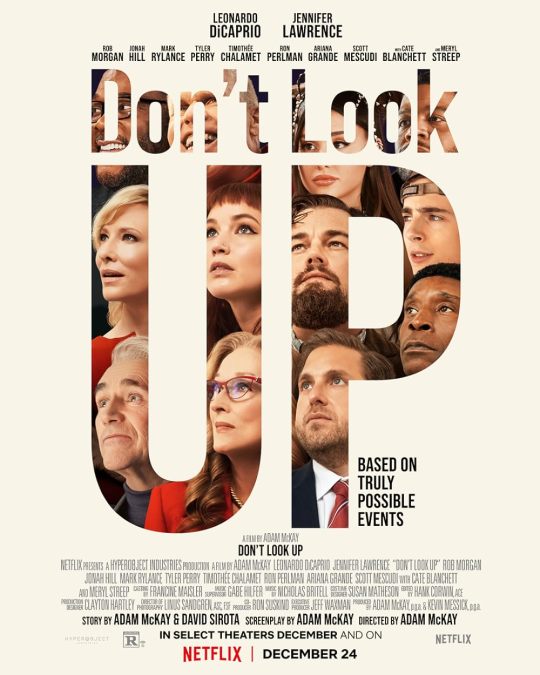
<Originally posted at https://kevinsreviewcatalogue.blogspot.com/2024/02/review-dont-look-up-2021.html>
Score: 4 out of 5
Don't Look Up is a movie that wants to be Dr. Strangelove for global warming, and whether or not it pulls it off depends on your tolerance for very heavy-handed satire. Adam McKay, the film's director and co-writer (together with former Bernie Sanders speechwriter/advisor David Sirota -- i.e. a man literally paid to write stump speeches for a politician) who had previously made The Big Short and a whole bunch of 2000s Will Ferrell comedies, wasn't shy about the movie he was making. He said point-blank that he went out of his way to write the most heavy-handed, blunt-force metaphor for global warming he could possibly think of, a comet destroying Earth that we have the ability to deflect but for some reason aren't, and the result is a pure sadist show filled with unlikable people who you're waiting to see receive their comeuppance, while the only ones who get anything resembling a happy ending are the beleaguered scientists and bureaucrats who serve as mouthpieces for the writers.
I felt it more or less succeeded at doing that, but I also felt that it, almost accidentally, stumbled into something I've rarely seen: a Lovecraftian comedy, specifically one that still goes all-in on his brand of cosmic horror rather than soften it. The central conceit of many of H. P. Lovecraft's stories, that of humanity being small and meaningless in the grand scheme of a universe far bigger than them that doesn't care about any of their puny accomplishments, is one that's usually played for horror, most notably by Lovecraft himself and the many artists influenced by him. When that kind of material is given a lighthearted touch, it's usually in the context of stories that borrow the aesthetics of Lovecraft's Cthulhu Mythos (doomsday cults, grotesquely visceral monsters with lots of tentacles, alien gods with unpronounceable names) but give humanity the chance to effectively fight back. This movie takes the opposite track. It's a movie about a comet that's coming to hit Earth and destroy everything. It doesn't give a flying fuck about any of us; it's a comet, an inanimate ball of rock and ice randomly drifting through our solar system that just so happens to be on a collision course with Earth. The protagonists, the graduate student Kate Dibiasky who discovers the comet and her astronomy professor Dr. Randall Mindy who does the numbers and realizes that it's going to impact Earth, are framed as the kind of heroes Lovecraft would write, people who slowly but surely go mad from the revelation of just how meaningless their existence is in the face of looming extinction. In fact, the basic premise is not unlike that of Junji Ito's manga Remina, which plays a very similar scenario for some truly fucked-up horror, complete with both stories having satire of celebrity culture as a running theme.
But this movie takes that premise and, instead of using it to try and scare the viewer, uses it to mine the darkest possible laughs it can think of. Kate's breakdown on a talk show as she tries to warn the world about the comet goes memetic and is treated like Britney Spears' meltdown in the late '00s. Dr. Mindy's reaction is to dive head-first into wine, women, and song, exploiting his new status as a rock star scientist to have an affair with a morning show host and bask in the fame and adulation of the world because he knows, deep down, that anything else is pointless and he may as well enjoy his last few months on Earth. And most importantly, the film's main satirical thrust is that humanity probably does have the ability to deflect the comet and save itself, but is just too goddamn stupid and greedy to do so. The President is a vain, corrupt, bullying, media-obsessed idiot whose administration is rife with nepotism, cronyism, and graft (guess who was President when this movie was written), the "visionary geniuses" of the tech industry are more concerned with a mix of pie-in-the-sky utopianism and getting rich than in the actual, practical, day-to-day problems that most people face, and the media is chiefly concerned with celebrity gossip and other frivolous stories and buries serious issues that might hurt their ratings. Humanity as a whole doesn't go mad from the revelation of the comet, at least not at first, but that's because, as far as this movie is concerned, we're already living in a world gone mad.
These two angles -- McKay and Sirota's intended one of a satire of the world's (lack of) response to global warming, and a film that takes a lot of the tropes of cosmic horror and plays them for comedy -- feed into each other and produce a pitch-black satire reminiscent of an Armando Iannucci story, a good episode of South Park, or the background worldbuilding of a Grand Theft Auto game. This movie ain't subtle. The comet is a plain-as-day metaphor for the climate crisis that practically screams the message into your face, most notably when Dr. Mindy goes on a furious rant on a talk show that, barring the specific subject matter of the comet, may as well have come from the unshackled id of any climate scientist, meteorologist, or environmentalist who decided to one day say "fuck it" and let everyone know what they really think of all the bullshit they have to put up with. The entire 138-minute runtime of this movie is an escalating exercise in cringe comedy as Dr. Mindy, Kate, and the underpaid civil servants and bureaucrats who take them and the crisis seriously find themselves stonewalled, tripped up, and belittled by the vapid, selfish, ignorant dumbasses who actually run the show. Its sense of humor is mean-spirited and often insulting, but it saves its bile for very specific and deserving targets while still affording enough humanity to its protagonists to make me actually care about them, especially as the film rolls towards its conclusion.
Make no mistake, though, this is a very funny metaphor for global warming, much of it sold by an excellent all-star cast. Meryl Streep plays President Janie Orlean as a combination of every terrible thing that's ever been said about Donald Trump and every terrible thing that's ever been said about Hillary Clinton (again, you can tell that a Bernie Sanders advisor co-wrote this), the kind of mediagenic, charismatic politician who looks good in front of the cameras but whose administration is a pit of slime. Streep is clearly relishing the chance to play someone who'd be an unrepentant villain if not for the fact that she's also a complete fucking moron. Mark Rylance plays the President's partner-in-crime Peter Isherwell as a mix of Elon Musk and Steve Jobs who gives off the sense that he's not just a greedy robber baron but someone who genuinely seems to believe his own bullshit, that his sci-fi scheme to save the day would not only work but elevate human civilization into a utopian golden age, and that he's spent too long marinating in the stew of hare-brained Silicon Valley techno-dreamers to think about any practical problems. Cate Blanchett and Tyler Perry as the talk show hosts Brie Evantee and Jack Bremmer are playing clear parodies of Kelly Ripa and Al Roker, and perfectly capture everything obnoxious and saccharine about morning talk shows and daytime news. The supporting cast is a non-stop parade of both rising stars and "hey, it's that guy!" actors, including Jonah Hill as Janie's Jared Kushner-esque son/Chief of Staff who serves as a symbol of the White House's corruption, Ariana Grande and Kid Cudi as a pair of pop stars putting on a benefit concert who contribute a hilarious song to the soundtrack, Ron Perlman as a war hero with a few screws loose who leads the initial mission to try and deflect the comet, and Timothée Chalamet as a punkish slacker whose response to the comet is to get right with God. Finally Leonardo DiCaprio, Jennifer Lawrence, and Rob Morgan get the "straight man" roles as Dr. Mindy, Kate, and the government scientist Dr. Oglethorpe, all of them offering up welcome reminders of why they're all considered some of the best actors of their respective generations (and, in Lawrence's case, reminding us why she was an A-lister before she did Passengers) as they have to navigate the sick, sad world around them in their long-shot effort to save it. Even here, though, they're not immune from the film's satirical barbs, each of them (especially Dr. Mindy) shown to not quite be as above-it-all as they assume they are.
The Bottom Line
It's so in-your-face with its politics and message that it risks feeling insufferable even if you agree with it. But me? I found it to be a hilarious, pitch-black, and frequently on-point satire that pulls no punches and manages to somehow combine big laughs with existential dread. I recommend giving it a watch.
#don't look up#2021#2021 movies#comedy#comedy movies#disaster movies#science fiction#adam mckay#david sirota#leonardo dicaprio#jennifer lawrence#meryl streep#mark rylance#rob morgan#jonah hill#cate blanchett#tyler perry#timothée chalamet#ron perlman#ariana grande#kid cudi
0 notes
Note
I kinda wonder, what could bakugou do (hori write bakugou to do) to make him less popular with the "anti" crowd. Like He was a horrid child no doubt and people who try to put blame on Deku or lessen the terrible shit bakugou did aren't great. But as we don't rly see it, we have to assume bakugous behaviour wasn't stopped, we only ever saw his mum "punishing" him when he was being rude after getting kiddnapped. Nothing will excuse what bakugou did, but he has stopped? He's overall a harsh person but he's not harrassing and bullying people anymore, specifically not deku, he's trying to attone for what he did to deku and has now apologised for it. His behaviour was never viewed as justified or good in the series, he's a scary figure in middle school, we're not meant to like his behaviour, so the series itself hasn't justified his actions.
As someone who relate to both bakugou and deku more than I'd like to admit (never told someone to jump tho, that's fucked lol) so I can 100% understand not liking or even hating bakugou but as someone who's not 15 anymore, looking back I also made a lot of really shitty decisions and like bakugou have tried to make up for it, and like deku I was 'friends' with people who hurt me.
Is there anything he can do for the "antis" to just dislike him rather that be "anti"?
(I'm very sorry if you've talked about this somewhere, you can just tell me to look for it if you have, I'll continue to look for your posts on the subject)
Hey there, anon! I think I’ve spoken about this only tangentially and/or in my main Bakugo meta, which is too big for anyone sane to read. So yeah, let’s chat here!
For me personally—and that’s all I can ever do: speak personally. I think it’s important to keep in mind that there is no single solution to please the “anti” crowd. Each fan will be looking for something slightly different in Bakugo’s character, much of which might contradict what a “stan” is currently enjoying. Given how charged a character he is, I'm not sure it's possible to get the entire fandom to like him—what I’m looking for hinges on having a different reading of the story than you seem to. Meaning, I think the series does justify his behavior. Not in any overt, super obvious way like having all the characters go, “Wow, Bakugo! I sure do love how you threaten people all the time. That’s super cool and heroic!” Things are rarely that straightforward. Rather, it’s in a more subtle, but consistent manner that paints a rather conclusive picture across hundreds of chapters.
Simply put, Bakugo is continually rewarded for his actions. Or, if not outright rewarded, his actions are ignored in a way that implies silent acceptance. Characters may not always like what he does... but they're willing to let it slide because Bakugo's heroism was always treated as a given, not something he had to earn and prove.
With the ever necessary disclaimer that I’m not fully caught up yet, here’s a list of some of the things that stood out to me in the first half of the series:
Bakugo’s bullying made him the most popular kid in school.
Bakugo’s bullying was ignored by/outright supported by the teachers.
Bakugo’s bullying did not hinder him from getting into U.A., one of the most prestigious hero schools around.
Despite acting horribly throughout his time at U.A. too, this behavior was continually ignored by the teachers and other authority figures around him.
Bakugo’s struggle to realize that other people aren’t “trash” doesn’t hurt his achievements in any way. He still gets top scores, still wins the tournament, etc.
Bakugo’s behavior gets him special attention from All Might, the greatest hero and Bakugo’s personal idol.
His behavior doesn’t make others dislike him in any manner that’s taken seriously. Everybody is still willing to not just put up with Bakugo, but—in time—start treating his behavior as a quirk (no pun intended lol) that they’re secretly fond of, rather than something he should legitimately be striving to change. Kirishima is the most overt example of this.
This is compounded by his behavior constantly being framed as humorous. Much like with Mineta’s perverted actions, characters might superficially go, “No, that’s bad!” but the story never demands any significant development because then we’d lose the “joke” of Bakugo screaming in rage at the slightest inconvenience, threatening to murder someone over nothing, constantly belittling everyone around him in a “funny” manner, etc. When fans talk about development of a manga character as archetypal and extreme as Bakugo, most don’t really want to see significant change to his base personality. Because then that would result in someone who doesn’t look like the “real” Bakugo: someone nicer, more even-tempered, more mature, etc. But for those of us who were never drawn to that personality in the first place, the continued acceptance of his rude, egotistical, and violent behavior is discomforting. The easiest comparison I can draw is between this and Bakugo’s mother slapping him. That slap is meant to be another “joke”—we see it constantly in shonen anime, something "humorous" you shouldn’t take too seriously because haha, it's just an overprotective mother—but many fans do take it seriously, using it as the basis for a whole “Bakugo was abused and this explains his behavior” reading. Well, I take the “joke” of Bakugo’s threats and insults seriously, especially in a story that starts with something like telling Izuku to jump off the roof. In the same way that many fans want others to treat Bakugo’s mother as a serious topic that has had a negative influence on his development, I want the series to take Bakugo’s everyday actions seriously as a negative influence on… well, everyone around him. But it doesn’t. His base personality is grudgingly adored.
The above two points are seen most overtly in Izuku, who never wavers in his respect for Bakugo despite how Bakugo treats him. Not just prior to U.A., but during their training too. Izuku, as the protagonist, is the emotional heart of this tale, so when he talks about how inspiring Bakugo is, it encourages the reader to see his behavior as inspiring too. Rather than, as said, something that needs to change. Izuku's continued friendship with Bakugo, his adoration of him, and his acceptance of the way he's treated has severely warped how the entire story sees Bakugo's actions. After all, if #pure Izuku can see the good in Bakugo, why can't everyone else? He must not be that bad after all.
I could get into detailed analyses of all the above—like how Bakugo was the one comforted after attacking Izuku outside the dorms at night and how the messed up relationship he has with Izuku is upheld as something to nurture; how the remedial courses he had to take were made to be rather silly, thereby undermining their supposed importance to his development; how Bakugo’s kidnapping had nothing to do with his flaws, but much of the fandom uses it as a way to dismiss any appropriate consequences because, “Hasn’t he suffered enough?” etc.—but in the interest of keeping this within a readable length, I’ll leave it at that. The point is that Bakugo has always been privileged when it comes to his behavior, resulting in others either outright praising it, ignoring it, or demanding that he change a miniscule bit, which always keeps him far below the standards of both his peers and the expectations of a hero. Everyone in 1-A must learn to be even better than the good people they already are... Bakugo needs to learn that other people aren't dirt at the bottom of his shoes. It's never been a particularly impressive development when pit against the rest of the class. All of which can make something like an apology feel pretty hollow. Yes, he’s apologized and I say with all seriousness that that’s great! But how does that apology stack up against 300+ chapters of content? As Bakugo’s words highlight, he's been a really awful person up "until now": he was consumed by Izuku being “miles ahead of [him],” he “looked down on [him]” because he didn’t have a quirk, he “didn’t want to recognize that,” he “hated that,” “grew distant,” “tried to beat you down,” “opposed you and tried to show my superiority over you,” and ends it all with, “it probably doesn’t mean anything telling you all this” before finally getting to the “I’m sorry.” This is basically a laundry list of how horrible a person Bakugo has been for the entire series, with an acknowledgement that this apology is coming really, really late. This is the moment where I could START to like Bakugo, depending on how he acts form here on out, but that pivotal moment arrived after six years of content and in the final arc of the story. It’s too late. Bakugo needed this kind of self-reflection and positive action 250+ chapters ago so he could (hopefully) grow into a better person across the story, not at the story's end. What we got instead is 322 chapters of him being a really horrible person, but the story going out of its way to excuse or even praise that behavior the majority of the time.
As a quick comparison to end on, I think what Bakugo needed was what Soo Jin got in True Beauty. You don’t need to have seen the drama to follow along. The tl;dr is that she has a lot of the core qualities of Bakugo: an all-consuming drive to win that was created due to abusive parents with high expectations, resulting in her bullying a peer to a pretty horrific extent. The difference between them is how the story frames their actions. When Soo Jin becomes the bully she loses everything. Rather than succeeding academically, her grades plummet, making it clear that this anxiety and self-doubt (things the fandom keeps insisting Bakugo is struggling with, but that rarely ever show up in the text) is actually impacting her day-to-day life. Her best friend drops her because she’s not going to support her choices. The boy she likes rejects her. She’s eventually forced to start over somewhere new - which importantly separates her from the girl she was bullying - and get some distance from her parents, resulting in the growth needed to become a healthier, happier, good person again. So when Soo Jin apologizes to the girl she hurt, it feels earned. The story continually recognized how horrific her actions were and put her into a place where she either had to change, or continue losing at everything else that was important to her. Bakugo? Bakugo doesn’t lose. Oh, he claims he does because he’s comparing himself to Izuku constantly, but that’s just him thinking in extremes. He still wins academically. Still wins many battles. Still wins at having friends. Still wins by maintaining the prestige of being a U.A. student. Still wins by getting All Might’s attention. Still wins by receiving Izuku’s respect and an agreement to maintain this rivalry that Bakugo is so obsessed with. Bakugo comes out well 99% of the time, he just thinks he's "lost" because he can't stand not being the absolute best.
For me, the story needed to have Bakugo face consequences for his behavior, not receive rewards and/or have others ignore it, and that revelation/apology needed to come way, way sooner. For me the issue is not a specific action that Horikoshi can have Bakugo do in the next chapter and them bam, I like him now. The problem is Bakugo’s entire concept, how he’s received by the entire cast, and his run across this entire series. "Entire" is the key word there. Which is why the “But he’s apologized. What more do you antis want?” reactions don’t sit well. What we wanted is a better written redemption arc across those 300+ chapters, not a single scene that’s meant to have us forget all the other problems inherent in the story. At this point it’s a far more complicated situation than, “Bakugo just needs to do X, Y, and Z and then we’re golden.” At the end of the day, Horikoshi failed to make me like him as a person and I’m pretty sure he isn’t going to change Bakugo enough to make him likable to me. Bakugo was never the sort of character I’d be inclined towards without a serious, nuanced redemption arc, but sadly, a core, crucial part of that redemption arc took six years to arrive. At this point there’s no way to change the problems in Bakugo’s writing for that huge chunk of the series and not enough time left in the series, it seems, to do the work we should have seen across the entire run. Honestly, idk if the Bakugo we'll get going forward is someone I can just dislike as opposed to being really uncomfortable with, but my money is on there being too little story left and too much investment in upholding Bakugo's base personality for that to happen. I could absolutely be proven wrong! But I think the problems are structural and needed to be better dealt with from page one, not hastily patched over in the final hour.
115 notes
·
View notes
Text
Morimyu in Classical reference
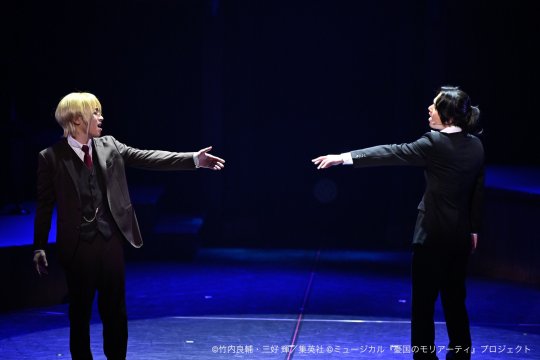
So, as for the fact that music in Morimyu Op. 3 resembles classical music in both progression and musical technicality, it's interesting how it's possible to keep coming up with different interpretations after re-watching the musical again and again.
I've made a thread on twitter about this before, but 1) word limitations and thread will never be enough to list all that I have to say lol 2) I'd prefer to have a fuller version noted down, especially one that I can edit and keep coming back over and over again when ever I come up with something new.
Either way, I am still (lol) not a pro in music theory and music history as well. All that is written here are based on my very very basic knowledge on music as well as something that I've picked up (and discussed) with my friends after watching Op. 3.
What's the point of this?
Why is it important? Lol I always need this to keep myself from writing off-topic but anyways. Why do the music sound good (except for the fact that because it does lol), and what do they represent? Surely there must be, and there always are, other things that are implied not only through the lyrics but also the music, and the flow in general.
Apart from the lyrics and the lines, it's also quite interesting to have a close look at the music - melody and harmony itself - to see how they portray the stories.
Most importantly, the continuality. How did Morimyu manage to insert so many songs and still managing to connect them as a whole? And how did they use music to go beyond what's on the pages?
That's the most important thing about musicals - beyond the pages. We don't see stage or anime doing so very often, as they mainly focus on what's already there, bringing them to life as close as possible to how we imagine things might happen.
As for musical, they have the music. They have the arias and the songs. At some point, a character starts singing, and other characters followed suit. They have their very unique way of expressing the plot, and they have the orchestra, the arias where characters get their solo song, and the duets between characters with strong relationships, and the ensemble which emphasizes the plot, and so on.
A funny thing about duets in classical opera, they're often meant to show lovers' relationship because of the harmony but can also use opposition and all to show enemies' relationship. And in SherLiam's duet it's just both of them at the same time - thoughts connected while engaging in a chase, a hide and seek game of mystery. We'll go into that later.
Back to the topic. Morimyu follows the main plot strictly, but also uses their advantage with music to add all the side details that wasn't told in the manga to create a "complete" view of the plot. It is always available for musicals to do something unexpected (like how we never expected Lestrade's puppet show to be a whole 5 mins long piece lol). And where they did that they added arias and duets, they allowed moments where characters express and developed their emotions as well as going with the plan (yes Albert yessss). Of course there's both a good and bad side to this all the while.
💛 The good thing is they went all the way to show us sides of emotions that we don't see much in the manga or stage, the sides of the story that all of them have kept hidden while focusing on their grand plan.
💛 But then it does get too emotional at some point, especially those who came for the plot and the mind games behind all of it (like me - although I won't deny that I had a lot of fun picking out all the emotions behind the music here lol).
Musicals can always go beyond what we knew. As for Morimyu, their music is heavily influenced by opera and classical music, and it's shown quite clear. There is live music playing (instead of the entire orchestra we have a violin and piano duet), and they have distinctive arias and recitatives throughout.
So thanks to that, it's also possible to use a reference from classical music to interpret their songs.
A Sonata formation - The Narrative Series of SherLiam
Yes, songs arranged and analysed with reference to a Sonata formation, especially in the way they progress through the play.
Some notes before getting into the point
1 - Sonata = a piece of music consisting of several movements - very often 3, sometimes 4.
First movement-Allegro: With the quick tempo, introducing the theme of the entire Sonata
Second movement-Adagio/Largo: Slow tempo, can be emotional sometimes, as well as leading more towards the final movement
Third movement-Rondo Vivace: The ending, quick-paced and vigorous, leading the Sonata to a close.
A Sonata always has a general theme, a topic. The theme that I chose to write about is Mystery - the Hide and Seek game between the Detective and Lord of Crime
2 - Aria and Recitative = different types of songs used in an opera
Recitative: Lines within a song that happens like a real conversation, as the characters sing they are also talking to each other
Aria: A solo section where everything else is a freeze frame, while one actor remains and sing their own song about their thoughts, feelings, etc.
In this post we're mainly discussing the arias of Sherlock and Liam, and the duet between them. But there's also some mention of recitatives here and there.
3 - Videos used
To make it easier to understand which songs I'm talking about, I also arranged them in piano. And also to have a listen at how they might connect.
Just in case the videos beneath don't work (they didn't work on my phone), the three songs discussed are Nazo, Liam's solo, Kokoro no Rondo, all piano arrangements.
All of the songs noted in this section are arias and duets from Op. 3 - the Ghost of the Whitechapel. The additional "series" that Morimyu has added spreading throughout the play, Sherlock and Liam's narratives, which portrays both their emotions and the chase between the detective and the Lord of Crime.
First Movement - Allegro: Nazo(謎) song
youtube
Starting from Lestrade's exit after his puppetshow and proceed to the scene, Sherlock's aria introduces the theme of the imaginary hide and seek game that the Lord of Crime has started. The song repeats the word (mystery) over and over again with a continuous rhythm.
Ends with Sherlock just mumbling the word Nazo (mystery) and exiting the stage - no conclusions, just like a mystery that leads into further mysteries with no answer.
♛♛♛ In regards to a Sonata formation, this is the beginning of the entire piece. Quick in tempo, written in 3/4 time and introduces the theme of the entire piece - Mystery.
Uso ka Shinjitsu ka - Lie or Truth song
Starting after Sherlock learns the truth behind Jack the Ripper, wondering if Lord of Crime is a good person after all.
Now I had a really hard time thinking whether this piece should be included or not. For one, it's not an aria.
It can be viewed as a Da capo Aria, a development section of the Nazo song, repeating the theme that is introduced, coming and going rather quickly. So, for continuality.
It also does not fit into the series as a whole, being
1) a recitative. The lyrics focus entirely on Sherlock's deduction and whether he should expose the truth or not, etc. so on.
2) The lines in here, unlike the other arias, are taken directly from the manga, so it's not entirely an 'added' element to this chase.
3) Also because if we compare this to a Sonata form, this doesn't really fit anywhere
However, among Sherlock's arias, this song can also be seen as an interesting development as I have mentioned above, so I've decided to have it here, still.
There's another thing about almost all of Sherlock's arias throughout the 2 stages - they never have a conclusive end. The detective's mind is always running, mysteries after mysteries.
Most of the other characters' songs ends with some kind of closing lines, and piano continues to conclude the piece with a strong end, and then goes on to start another piece. All of their problems in the songs are concluded. They made up their minds in some ways.
But Sherlock, his songs always end with him repeating the melody, a capella, and exiting the stage. Piano waits for him to exit, then starts a new song. Or in Op. 2's Mindgame case going straight into the next conversation. We never get to know how Sherlock's songs end, because they didn't really end at those points. There's a hanging sense of waiting for a resolution, a conclusion. Sherlock never seems to have his problems solved within the songs, they just go on and on.
An idea initiates, then something happens and he is once again in the dark. And he spins around within his own mind.

Screenshot from Op. 2. Even if we look back to his aria Mindgames from Op. 2, this song doesn't really have a conclusive ending as well. He just starts singing, the music stops and he starts shooting and going on, resuming the play. It kind of has been a thing for Sherlock's arias?
Second Movement - Adagio/Largo: Liam's solo
youtube
♛♛♛ The "second movement" - the 'slower' piece - of the series, Liam's aria lol but actually the piano part of this song isn't slow at all but ok. The other side of this hide and seek game. The "development" section of the sonata series, where we see things in a much more emotional way.
This aria is much richer in harmony and melody. Not only Liam's melody, but also the piano's part which plays a beautiful melody in harmony.
I recall an interview where the stage director mentions how the "orchestra" - piano and violin are representations for Liam and Sherlock. It kind of applies here, where his music is created mostly by piano.
There is modulation, emotions rising and elevating quickly and strongly. But the harmony is beautiful, overflowing and rich with emotions. The song repeats certain lines, emphasizing aspects within Liam's thoughts.
Unlike Sherlock's train of thoughts that circles with no destination, Liam's solo has a definite ending in harmony -> Even with all his emotions in mind, Liam still has a goal already set before him. He has a brief moment of slowing down, pausing and sung about his feeling, before resuming the story.
Leading us to the final stage - Kokoro no Rondo.
Third Movement - Rondo Vivace: Kokoro no Rondo
youtube
Rondo formation: Rondo is a type of dance that revolves around a pattern, often ABA, ABACA, or ABACABA - where A is the ritournello ("meguri - kimi ni omou - meguru kokoro no rondo" section) that is repeated over and over with B, C parts in between. Rondo can also be combined with sonata form - this case applies to this song which begins with a key other than the tonic (Fm) before resolving to the tonic key (Fm) to put an end to the entire sonata series.
For reference purposes, the last movement of Beethoven's Pathetique or the very typical Fur Elise is also written in a similar format. I also referred to Pathetique quite a lot when brainstorming this post.
♛♛♛ The "final movement" of this Sonata, the final scene of their "Hide and Seek" game. The song's tempo is vibrant and rapid, combining with the dancing sense, all the while strictly following the structure of a Rondo as mentioned above.
This is the stage where Liam and Sherlock's line interacts and reply to each other, as if in a real conversation - just like how the connection between them are now much stronger than what they had before.
In the ritournello, we have Liam and Sherlock's lines intertwining and chasing after one another, emphasizing the "Hide and Seek" element between the two of them.
The song comes to a definite ending, concluding with a strong tonic (Fm) chord. At this stage, there is no more question to be left open, for Sherlock at this point has already made up his mind to take the next step into solving the mysteries regarding the Lord of Crime.
Their imaginary game of Hide and Seek is coming to an end, as Sherlock came to a decision to take the next step - going to Durham.
That's the end of my first draft.
So far that is some of my thoughts noted down right after watching Op. 3 stream a while ago, with some edition made just now.
On the side note, at some point during my discussion with a friend, we also came up with the idea that a Suite may be a better reference. A Suite consists of 4 parts and a prelude, each of them having their specific characteristic. But we didn't go all the way analysing that idea, as
1) we couldn't find a 5th piece that can be added into the series.
2) Even if we did, the Truth or Lie song still would not really fit into the "aria" vibe of this series, as mentioned above.
But then quite interestingly, after a while, I've found another interesting fact that should have been quite obvious but I've missed for (lol) like ages.
The game of Hide and Seek between the detective and the Lord of Crime has begun ever since after Hope's case - that being said, ever since the end of Op. 1
And what is it that we have in Op. 2? "The Mind games of the Lord of Crime". The one where Sherlock went maniac rapping about all the thoughts he has and end up shooting randomly into the wall.
At first it begins like another recitative, but in the later half, the harmony starts to become more harmonious, written in 3/4 time flowing like a dance.
In that section, the melody of the piano and violin part resembles the one we have in Kokoro no Rondo, the Ritournello section, only that the melody of the violin in Op. 2 and the melody that SherLiam sung in Op. 3 are kind of reversed.
Coincidence much?
So now we have a collection of songs from both Opus, it becomes tricky. How do we connect them? And what's the story?
At this point, all these recitatives, aria and duets all in the theme of the Hide and Seek game. And they all connect to each other through harmony, progressions in harmony.
We know that the Mind games of the Lord of Crime has begun from ever since the end of Op. 1. We know that Sherlock keeps wondering about that in Op. 2, and then he wonders even further after he has been tested by the Lord of Crime. "また俺だけのメッセージなのか?" - Is this a message just for me?, as he wondered in the Truth or Lie song. We knew all of that. But Morimyu didn't let that stop them from emphasizing on this subplot even further.
They didn't let the gap between Op. 2 and Op. 3 stop them from making a smooth flow in plot either.
Correction, they didn't simply create a flow. They established a connection, all the while showing a strong progression of Sherlock's thoughts that goes on from Op. 2 straight onto Op. 3.
Very often, what makes a good plot is how their plots and sub-plots intertwine with each other. Morimyu has a main plot that follows Moriarty gang in the plan of changing society. And they have a smaller plot told from Sherlock's side of things.
And they have this sub-plot told by harmony of how Sherlock is connected to Liam, or the Lord of Crime, by an invisible thread. A connection that is only expressed that clearly in Morimyu.
We have so many things going on, so many songs throughout the play. But each of those elements are all connected to something else, creating a sub-plot that enriches the main plot.
There is no loose connections. For everything that connects to the main plot, they're also linked to other elements. Each scene and every song has their own meaning not only in regards to other songs, but also to the plot as a whole.
Also, did I mention how Morimyu feels like a grand piece of music?
Opus -> What classical songs had that basically shows the order in which they are written. Morimyu - a title piece itself - has 3 Opus, 3 different parts with the same theme.
Classical music very often had all the different elements in it -> Morimyu had an overture, the song they sing just before the main theme song, just before introducing the stage. Then arias, ensembles and choruses. All of them are connected by similar harmony.
Classical music always had a big general theme, with each section having a smaller sequence connecting to each other. Subplots within a big plots. A Sonata piece has 3 movements, each having their own "sections" of development - expositions, development, recapitulation. -> Morimyu does the same to their plot and subplots, as discussed above.
Also, Opera reference
While Opus 2 used an opera reference to tell the story, I feel like Opus 3 has become an Opera itself. During Op. 2 the arias were mostly very loyal to the manga, taking their lines from the original work, like the Mind Games song. Their story progresses steadily but logically.
However starting from Op. 3, the aria became more independent. They developed and expressed even further what wasn't said in the manga. For instance, the 3 songs mentioned in the "Sonata" above. And there's also Albert's solo, and Patterson's solo and Milverton, which I haven't got the chance to discuss all.
But either way, they spring out of the original story, adding more emotions and "colours" to the characters. The aria became more original, all the while also much more expressive. We get to see new sides of the characters that we haven't seen anywhere before.
Anyways, it's probably time to go back to the main question: How Morimyu used music to go beyond what's on the pages.
-> Musicals aren't simply about music added to acting. The characters on stage don't just simply starts singing for no reason. All the songs are meant to express something, and while they do they also establish various connections to the plot's progression.
We don't get to see much of the characters' emotions in the manga. And we don't see much of the side story, the finer details behind each arc. Every time, Morimyu adds something original to enrich their plot. They express and develop what's already known to all the viewers, especially regarding the emotional and motivational side of the characters.
-> The manga shows us the entire plot, with details related, back stories that lead to the present, and all. But it doesn't give a lot of hint into how characters might feel. Surely, reading between the lines, it's up to the readers to interpret them.
But Morimyu gives us all of that, and they leave it to us to read between the music.
And even if we didn't, that's fine. Then the purpose of all of them linking together would be to create a performance where everything is connected harmoniously, allowing us to be emerged in the world of Yuumori.
-> The purpose of having a stage, primarily, is to allow the audience to engage in, experience and feel the emotions along with the characters they see on stage. The point of having a live stage, a plot, and the music, are all to let us emphasize with the characters on stage.
In Morimyu, we aren't just watching a plot between our favourite characters happening as we know it from the manga. We see a combination of mysteries unveiling slowly, the stories on the side of each characters as they slowly progress forward, as well as emphasising with their emotions in the story.
That's what I really like about Morimyu.
So, WHAT'S THE POINT OF THIS?
So I had to scroll back to the top (lol) to quote this and make sure I haven't gone too far from the main theme.
Regarding musical Yuumori, there's always so many things I'd like to talk about. And if I start going on about it then it only gets harder to focus on one single topic.
Since the topic here is Morimyu and their music, especially in classical reference, I've tried to keep everything I've discussed relevant. But whenever I start on something, there would always be something that comes to mind. Like how other songs might also have certain connections, or how they used stage directions and lightings, etc. I really want to look more into stage directions in Morimyu as well, but that would have to wait...
Anyways, I tried to keep this as simple as possible. When I sent the first version of this to my friends, I keep having the feeling that I got too technical with all the theories about harmony and structure lol
And once again, this is only some of my own interpretation of the series that I've picked up.
If something else came to mind... well. Either way, for the purpose of engaging in their wonderful music or for the purpose of watching a beautiful stage just for enjoyment, Morimyu definitely is worth watching. And to watch over and over again. I've said this for Op. 2 but I'll say this ten times as much for Op. 3. Truly magnificent.
And, that's pretty much it that I have for today, I guess.
Thanks a lot to all my friends who gave me lots of inspiration and motivation to complete this ヽ(・∀・)ノ
Lots of love to @rikaaki as well ヽ(・∀・)ノ
#Youtube#musical moriarty the patriot#musical yuukoku no moriarty#yuukoku no moriarty#sherliam#random thoughts idk why#didn't mean for it to be this long but still just random thoughts I'd like to get down#still love this series too much although I feel like I've watched it too many times#harmony analysis I'd like to call it but there wasn't a lot of harmony analysis going on either#morimyu#morimyu and how their music is just extraordinary
90 notes
·
View notes